
Beyond Biology
Keeping Our College Students
Handling Difficult Topics With Your Teen
She Didn’t Come Back the Same
I Look to the Stars
Special Concerns of Pastors’ Wives
The Great Dechurching: Part 2


Keeping Our College Students
Handling Difficult Topics With Your Teen
She Didn’t Come Back the Same
I Look to the Stars
Special Concerns of Pastors’ Wives
The Great Dechurching: Part 2
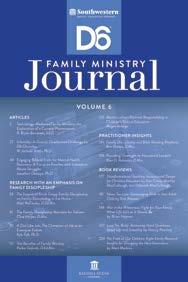
The Southwestern D6 Family Ministry Journal Vol. 6 is a peer-reviewed journal providing a comprehensive approach to the family ministry conversation by reminding ministry leaders of the various audiences present in the church community. The articles found within bring attention to family ministry and key elements of pastoral duties in connection to discipleship in the home. This journal aggregates content submitted by scholars from various universities, seminaries, and ministry organizations as well as relevant book reviews. An added bonus is practitioner insights in shorter, non-peer reviewed submissions.

The return of Christ is a key promise of Scripture. This book examines the entire New Testament teaching on the second coming of Jesus, emphasizing the things we agree on more than the things we differ about. There’s too much we agree on for disagreements to divide us and rob us of joy in the prospect of seeing Him.

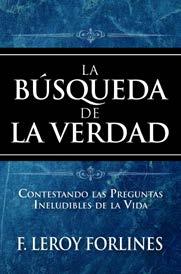
The study guide is a companion book to Mere Eschatology: A Biblical Study of the Second Coming and the End of the Age. This booklet is designed to be used individually or as a group study.

The “inescapable questions of life” are answered from the standard of God’s authoritative Word. This invaluable tool seriously discusses profound truths for every facet of life. Biblical truth should be made applicable to the total personality.
Bags: Helping Your Kids Lighten the Load by Chris Sasser
Rest. Overcoming Spiritual Fatigue by Marianne Howard
War in the Wilderness: Fight for Your Family When Life Isn’t as It Should Be by Brian Haynes
Not So Perfect Mom: Learning to Embrace What Matters
Most by Amy Rienow




Needing a break from the crowds and noise of last year’s National Convention in Raleigh, North Carolina, I slipped quietly into the back of a dimly lit ballroom. For 15 minutes, I listened to an elementary student quote impressive portions of Scripture. She listed the books of the Bible (by their division) then quoted a psalm, the Great Commission, the Romans Road passages, and 1 Corinthians 13. No hesitation. No doubt. The young competitor spoke clearly and confidently, likely unaware these powerful passages would travel with her throughout life and help determine her future.
The moment took me back to Anaheim, California, in 1983, and my own first experience in CTS competitive activities, an annual part of the Vertical Three Conference. The roots of the conference date to the Free Will Baptist League established during the early years of the National Association. The League held its first nationwide conference for youth in 1948 in Nashville, Tennessee, and began to sponsor activities and events at conventions that followed. In the mid1960s, the newly organized CTS (Church Training Service) department introduced Bible Sword Drill and Declamation competition, soon adding the Bible Memorization, Bible Bowl, and Bible Tic Tac Toe categories.

student and later as the national youth coordinator) taught me a great deal about the diversity of the denomination, the power of worship to bring Christians together, and the importance of humility when working side-by-side with other believers through long, hard days.
The first “National Youth Conference” was described in the 1968 Contact magazine report on the Oklahoma City convention, and the Music and Arts Festival began in 1972 (just like me), expanding the existing competitive activities to include a broader range of categories, all designed to develop the talents of young people for Christian service.
CTS had a profound impact on my discipleship growth, both spiritually and practically. Spiritually, CTS sent me into the Word again and again, pushing me past “the basics” of the Bible toward a more complex understanding of God’s story.
Practically, I participated every year from third grade (1983) through my junior year of college. I competed in most categories: Scripture memory, art, writing, drama, singing alone and with groups, piano, sword drill, and Bible Tic Tac Toe. This broad experience set the stage for my current wide range of ministry responsibilities. Amazingly, many activities I first encountered in CTS are mirrored in my daily tasks at age 51. Training and traveling with YET (both as a
It may sound strange, but I am also grateful CTS competition taught me I didn’t have to “win” to be successful in God’s service. Over 13 years and nearly 200 entries, I only won at the national level a single time — my final entry as a college junior. I didn’t realize each “disappointment” in competition was preparing me for a ministry filled with moments where I would win some, lose some, and occasionally fall flat on my face. I am glad CTS taught me to handle “failure” early and to trust God with results, even when my best efforts didn’t seem to be enough.
Today, of course, I look back and understand the results of competition mattered little, but the Bible and ministry knowledge I acquired over those years changed my life forever.
Enthusiastic applause brought me back to the moment, as the relieved young lady offered the audience an enormous, dimpled smile, breathed a visible sigh of relief, and skipped from the stage.
I couldn’t help but smile.
Another generation equipped “for the work of the ministry, for the edifying of the body of Christ” (Ephesians 4:12).
About the Columnist: Eric K. Thomsen is managing editor of ONE Magazine. Email: eric@nafwb.org.


SUNDAY, APRIL 28
LEARN MORE: NAFWB.ORG/TOGETHERWAY
EDITOR-IN-CHIEF: Eddie Moody MANAGING
EDITOR: Eric Thomsen
ASSOCIATE EDITORS: Ken Akers, David Brown, Jeff Caudill, Adra Chandler, Chris Compton, Danny Conn, Bethany Douglas, Ruth McDonald, Deborah St. Lawrence LAYOUT & DESIGN: D6 Family Ministry DESIGN MANAGER: Andrea Young DESIGN: Marianne Stewart PRINTING: D6 Family Ministry

We measure what we treasure. Our children and grandchildren grow day by day until they mature. Looking back, we marvel at how quickly those wonderful years flew by. The same is true of retirement savings. Started early and nurtured well, day by day, it grows to maturity. One day, we will look back and marvel. Contact us to start today!

Daniel 3 records the account of three young men who faced a trial of their faith. They were removed from their homes and separated from the influence of their families. In a hostile environment, they determined not to conform or compromise. They chose to be faithful to God, no matter the cost, and entrusted their lives to Him. These young men stood tall. They
Vertical Three is a ministry of D6 Family Ministry. The mission of Verto help students discover their talents, develop their leader -
to help students discover their talents. How do we accomplish this task? One primary way is through CTS Ministry Expo (CTS). CTS is not about winning and losing. We really should remove the from our vocabulary when thinking about the purpose of CTS. The goal of CTS is to provide opportunities for students to identify and develop God-given abilities for use in service to the Lord and His church. All categories are structured to help students discover talents they can use to glorify God and serve others. The Youth Evangelistic Team (YET), made up of CTS Expo participants, takes this skill development and training to the next level. This group of students travels across the U.S., leading services and serving churches. The YET experience culminates with the team leading worship at the annual Vertical Three
Vertical Three also strives to help students develop leadership skills. Since 1984, Truth & Peace Student Leadership Conference (Truth & Peace) has been the primary tool used to accomplish this mission. The purpose of Truth & Peace is to teach and train students to learn with humility, serve joyfully, lead with grace, and love selflessly in churches, youth groups, homes, and schools. Students are eligible to apply for Truth & Peace if they attend a Free Will Baptist church and are in grades 9-12. Truth & Peace seeks students maturing in their relationship with Jesus, actively involved in their churches and youth groups, and providing leadership and service in their local churches. Students who exhibit Christian maturity and lead others in following Jesus Christ are encouraged to apply.
A third aspect of the Vertical Three mission is centered on helping Free Will Baptist youth dedicate their hearts to faithful service to God. This is accomplished through the program at the annual Vertical Three Conference (V3). Held simultaneously with the Free Will Baptist National Convention, students across the denomination take part in V3. Activities for all ages (Preschool, V3-Kids, V3-456, and V3-Teen) are planned carefully and intentionally,
challenging students to follow the Lord through a personal relationship with Him. Students who already have a personal relationship with Christ are challenged to live their lives in full surrender to the Lord and His calling on their lives.
In a world where many students leave the church after high school, these Vertical Three ministries are vital in preparing Free Will Baptist students to defy the odds and stay committed. Strengths like deep Bible engagement (CTS), serving in ministry (YET and Truth & Peace), and interacting with godly individuals in charge of these ministries are key to increasing the probability our students will stay connected to the church.
Let’s work together to ensure the students of the Free Will Baptist denomination follow the example of the Hebrew teens in Daniel 3.
Let’s help our students become Vertical Three!
About the Writer: Derek Altom serves as director of events and development at D6 Family Ministry. You can reach Derek by email at derek.altom@d6family.com.
May 5
• Ten Commandments
• Exodus 20






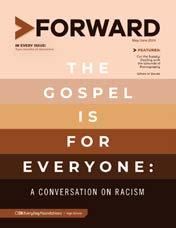
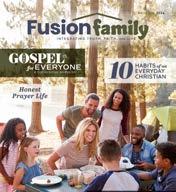
May 12
May 19
May 26
• Offerings to God
• Leviticus 1 –7
• The Church Is Born
• Acts 2:1–47
• The Gospel Is for Everyone
• Acts 10:1–48
June 2
June 9
• The Apostle Paul
• Acts 9:1–31 and others
• The Church Expands
June 16
• Walk in Purity
June 23
June 30
• Acts 17:1–9; 1 Thessalonians 2:1–20
• 1 Thessalonians 4:1–9, 12
• Wait in Faithfulness
• 1 Thessalonians 4:13–18; 5:1–11; 2 Thessalonians 1:5–2:12
• Everyday Christian Living
• 1 Thessalonians 5:12–38
To order, call 800-877-7030 or visit
www.d6curriculum.com


The definition of family extends far beyond the nostalgic scenes featured in Norman Rockwell paintings. The concept of family has changed, embracing a spectrum of structures and experiences, not all healthy or biblical. Many families today are broken and hurting, producing barriers to the faith. For example, young adults with abusive fathers struggle to relate to our Heavenly Father as grace-filled and loving. In a society where broken families are common, the church needs to consider family outside the traditional description, but within the biblical prescription.
Today’s family is messy, falling far short of the idyllic imagery of “the good ole days.” When pastors describe family or family ministry, do not expect them to fit the mold of a

mom, dad, two kids, and a goldfish. Though not everyone is called to marriage or parenthood, these terms hold value because God established family as humanity’s cornerstone. Single college students away from home may not consider themselves part of a family in their current season of life, just as older adults whose kids have left home may no longer feel the family label fits. How do we help them understand they are all part of family ministry?
At D6 Family Ministry, we address inquiries from those who feel detached from family ministry, whether college students or childless couples. They question their place within the concept of family.



Scripture explains that upon embracing faith, one finds his or her place in God’s family, a bond stronger than biology, where we are all His children, adopted into a divine kinship.
Adults without children may reflect various circumstances, yet all remain integral to God’s design. While not everyone will follow the path of parenthood, including everyone remains crucial. Churches thrive by embracing all generations and seasons of life, ensuring no one feels alienated from family ministry due to parental status. Adults without their own children can profoundly impact the younger generation through mentorship, embracing the adoptive spirit of family ministry. When adults take interest in the kids in the church or community through prayer, coaching, teaching, volunteering, and more, they help shape the worldview of those young people. Paul did so with Timothy and Titus, as Eli did with Samuel, and Mordecai with Esther. We describe this kind of family ministry as an adoptive model, where people more spiritually mature influence younger believers or those who need Christ.
Regardless of personal situations, everyone belongs to some biological family and, more significantly, becomes part of God’s family when he or she accepts Christ. At D6 Family Ministry, we view family ministry and generational discipleship as biblically inclusive concepts,

unbound by age or biological ties. Ministry extends beyond church walls and involves seeking and connecting with those around us, thereby weaving the fabric of a broader, more biblically inclusive family.
Defining family extends beyond the leaves of genealogy to the roots of our faith.
Your church may not have children or teens, but your ministry is not limited to worship services. We are in a day when people no longer seek out church to find Christ. We must, instead, seek them, connect with them, and over time, influence them toward the faith.
Inside the D6 family, every story has a home, and defining family extends beyond the leaves of genealogy to the roots of our faith, where every branch is nurtured by God’s design and flourishes within the community of believers — beyond biology.
About the Writer: Ron Hunter Jr. has a Ph.D. in leadership and is CEO of D6 Family Ministry. You may contact him at ron.hunter@d6family.com.

D6 Family Ministry recently brought HomePointe into the valued family of D6 resources to serve churches and families. HomePointe, known for providing a family resource center in church lobbies, sets your church apart in a practical and visible manner. HomePointe will now be known as D6 HomePoint, and you can learn more about why this approach will enhance your ministry to families by visiting D6HomePoint.com.


 BY EDDIE MOODY
BY EDDIE MOODY
Every year, hundreds of Free Will Baptist students participate in programs led by D6 Family Ministry and IM, Inc. Alumni from these programs provide a snapshot of Free Will Baptist youth. The programs include ETEAM, Truth & Peace, Youth Evangelistic Team (YET), Church Training Service (CTS), and the College Missions Program (CMP). We surveyed recent participants of these programs, and the results that follow point to best practices to help youth transition into adulthood.
The sample consisted of 160 alumni who responded to a survey invitation. Respondents (see the chart below) can be broken down as follows: ETEAM (54%), Truth and Peace (64%), YET (11%), CTS (36%), and CMP (19%).
Many respondents participated in multiple programs. Thirty-one percent were male, and 69% were female. They ranged in age from 17 to 27, with a mean age of 19.66, a mode of 19, and a median of 19. All of the respondents are part of Gen Z.
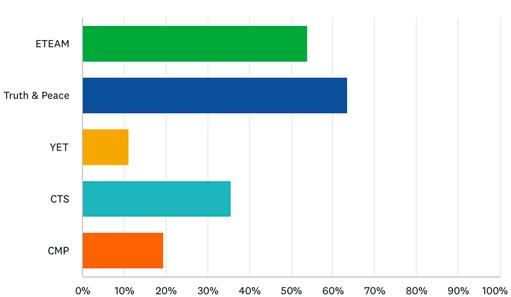
These young adults are engaged in a variety of activities broken down as follows (see the chart below): attending college full-time (55%), working part-time (36%), working full-time (22%), part-time ministry (16%), attending college part-time (8%), full-time ministry (5%), military (1%), and other (mostly attending high school) (14%). Many participants were engaged in more than one activity.
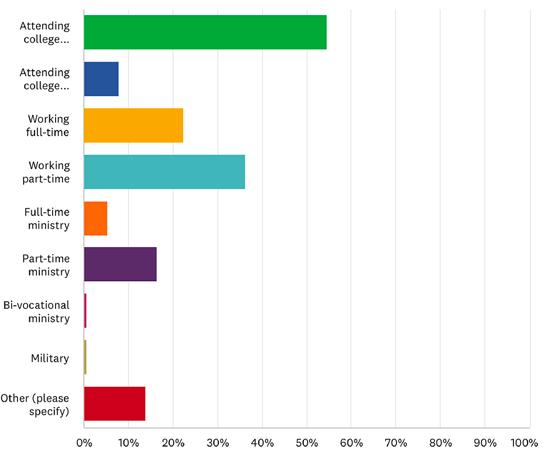
Of those attending college, 43% attend a Free Will Baptist college, and 22% attend a non-Free Will Baptist Christian college. Fifteen percent attend a community/junior college, 14% attend a state university, and 1% attend a

private, non-Christian college. Four percent of respondents indicated “other.”
Respondents’ classifications can be broken down as follows: freshman (34%), sophomore (28%), junior (16%), senior (18%), and graduate student (3%).
When asked if participation in ETEAM, Truth & Peace, and/or YET influenced college selection decision, 57% said yes, and 43% said no. On a scale of one to five, the top factors influencing college decisions were major (4.11), followed by finances (3.15), student life (3.05), geography (2.82), and legacy (parents attended) (1.87).
The sample was asked to list their specific college majors, which clustered around the the following areas.
Other: Culinary Arts, General Studies, Office Studies ...............................


We are aware of the sad news regarding youth in the church (or the lack thereof). According to reports, 70% of youth stop attending church and start leaving when they graduate from high school. Only about half of them return to church within ten years.1 In a recent study, only 15% of recent high school seniors attend church at least once a month.2 Gen Z is the least churched generation in American history.3 How does this sample compare?
When asked about church attendance, 99.25% of the respondents reported regular attendance.
Seventy-five percent referred to their parents, family, or being raised to go to church as the reason for their attendance patterns. The sentiment was summed up by one respondent: “I was raised going to church every time the
1 M. Yoder, (May 17, 2003). “Why Youth Leave the Church: 10 Surprising Reasons Teens Disappear.” Accessed: https://churchleaders.com/ youth/166129-marc-solas-10-surprising-reasons-our-kids-leave-church.html
2 Ryan Burge. “How Has Religion Changed Among High School Seniors?” Accessed: https://www.graphsaboutreligion.com/p/how-has-religion-changed-among-high?utm_source=post-email-title&publication_ id=1561197&post_id=141684462&utm_campaign=email-post-title&isFreemail=true&r=2r67mg&triedRedirect=true&utm_medium=email
3 Samuel J. Abrams. (March 6, 2023). “Perspective: Why Even Secular People Should Worry About Gen Z’s Lack of Faith. American Enterprise Insitute.” Accessed: https://www.aei.org/articles/perspective-why-evensecular-peopleshould-worry-about-gen-zs-lack-of-faith/#:~:text=Pew%20 Research%20repeatedly%20found%20that,boomers%20and%20the%20 Silent%20Generation
doors opened!” This is consistent with other research that indicates teens tend to take after their parents’ religion.4
Respondents attend the following churches: Free Will Baptist (85%), non-denominational (7%), SBC (5%), other denominations (3%).
When asked why they chose the churches they are attending, the following responses were typical: “While I’m away from my home church, I wanted an atmosphere that felt like my home church with sound doctrine and great preaching.”
One respondent not attending a Free Will Baptist church stated, “A Free Will Baptist church was not within a good driving distance from my school, so I knew I would have to search a bit harder for a church. I wanted a church with doctrinal teaching and clear concern for their youth/ college students. I also wanted a church active in missions and discipleship. The church I have been attending for nearly three years offered each of these and more.”
It seems a sense of belonging is what attracted most of them to the churches they attend. Here is one example: “My family has attended our church for my entire life. I am to the age where I could go somewhere else if I wanted but I do not want to because I am in a church that truly loves me and teaches the Word of God the correct way.”
Notice, the respondent never considered not going to church (the case with most members of Gen Z) but chose to stay at that church for many reasons, including a sense of belonging. Incidentally, this is consistent with previous research about churches that attract and keep young people.5
It is clear these respondents attend church, but are they involved? Yes, 87% reported being involved in church ministry, and most were involved in multiple ministries. The ministry types include children and youth ministry
4 Pew Research Center (September 10, 2020). “U.S. Teens Take After Their Parents Religiously, Attend Services Together and Enjoy Family Rituals.” Accessed: https://www.pewresearch.org/religion/2020/09/10/u-s-teens-take-aftertheir-parents-religiously-attend-services-together-and-enjoy-family-rituals/
5 J. Mulder (June 13, 2016). “Meet the churches young people are loving (and not leaving)." Fuller Youth Institute. Accessed: https://fulleryouthinstitute.org/blog/meet-the-churches
(54.5%), worship (singing, playing) (40.33%), A/V ministries (11.99%), Sunday School/CTS/discipleship (9.81%), preaching/teaching (7.63%), and hospitality/greeting (8.72%).
Consider this typical response: “I run my church social media, make the media for slides/announcements, teach kids class every week, and sing in our worship band every week. I also am part of a weekly discipleship group as well.”
In addition to being involved in their churches, the sample expressed interest in continued involvement in the denomination. Eighty-nine percent reported plans to attend future National Conventions.
Students were asked to share ways the programs impacted their lives. The following alumni provided specific examples: ETEAM (71%), Truth and Peace (56%), CTS (37%), CMP (50%), and YET (71%). Some responses are included below:
>>> ETEAM taught me missions isn’t just overseas, opened my eyes to [North American Ministries], and gave me peace about my calling to church planting.
>>> I felt called to youth ministry during one of my ETEAM trips and have now added a missions minor because of CMP.
>>> ETEAM and CMP opened my eyes to the realization this is what God wants me to do. It placed peace in my life that I can do missions overseas. God has placed this passion in me through these opportunities.

CMP & ETEAM
CTS >>>
TRUTH & PEACE
YET
iminc.org/go/student-missions
verticalthree.com/ministries/cts
verticalthree.com/ministries/truth-peace
verticalthree.com/ministries/yet
>>> Truth and Peace changed my life. It really made me come out of my shell and comfort zone. It forced me to realize I was missing out on a lot of what God had planned for me. It’s when He revealed I needed to just stay home for college and start my girls ministry.
>>> Truth and Peace helped me build a good foundation in the FWB denomination and develop in my leadership skills.
>>> ETEAM and Truth & Peace gave me the foundation I need when it came to looking for a church in college!
>>> Truth & Peace showed me I could make a difference in my community. I go to college in my hometown and I felt like because I wasn’t moving away I couldn’t have an impact. However, my experience at Truth & Peace showed me I could be a leader in my church and in my college community. I participate in a weekly Bible study group on campus and have shared my own testimony as well as devotions because of the preparation Truth & Peace gave me.

>>> CTS itself taught me the importance of memorizing Scripture at a very young age. Passages I memorized when I was in elementary school for Bible competitions I can still to this day recite! For that I am very thankful!
>>> CTS taught me so much Scripture that has stayed in my mind and helped me recall those verses in times of need.
>>> CTS taught me an enormous amount of Bible that has helped me so much in recent years especially going to

public school. I believe Bible competition [shows] how vital studying God’s Word is and developing those patterns from a young age.
>>> CTS helped instill a love for studying Scripture.
>>> CMP has positively impacted my life in so many ways! From this opportunity I learned more about myself and how God is planning to utilize my spiritual gifts for His Kingdom. I was impacted by living with missionaries and seeing their day to day, as it opened my eyes to how to live your life on mission for God. Furthermore, CMP allowed me to fully surrender my future to Christ, so He can use me for His glory.
>>> CMP showed me the need for more missionaries and placed a burden on my heart for the people of the country in which I now serve.
>>> Participating in ETEAM and CMP led me to understanding how important missions is. I learned how it starts at home and in your local church and community and that it isn’t just overseas. It was also eye opening to learn how no matter how I want things to go, God’s timing and plan is greater than my own.
>>> YET taught me to use my talents for the Lord and also showed me that no matter how small your ministry might feel, you’re always making an impact.
>>> YET taught me how to lead others in worship while also worshipping as well.
>>> I’ve continued to serve as part of worship teams.
Thirty-four percent of the respondents indicated something they had been given from being part of their program. “CTS gave me extra motivation,” and “ETEAM gave me confidence in evangelism.”
Similarly, the word help or helped was used by 25% of respondents. “ETEAM helped me grow closer to God.” “Truth and Peace helped me grow as a leader.” “The program helped me out of my shell.”
Finally, 18% used the word learn or learned, and another 17% used the word taught when describing their experiences. “I learned many ways to minister.” “I learned about God and His goodness.” “They taught me how important it is to have a servant’s heart.”

What does all this mean? This sample is a true anomaly in America, not unlike the Hebrew youth in the book of Daniel. These students are tied to their families, churches, and denomination. How did it happen? Clearly, the role of parents and their home churches laid the foundation, while these programs built upon that foundation.
Where do we go from here? Currently, only 4.3% of Free Will Baptist churches have students participating in these programs. Last year, we set a 3 for 30 objective to expand the percentage of churches that participate. Additionally, we must highlight the effectiveness of these programs and activities. As we live in a world turned upside down, we must engage in activities that are working. Let us highlight and expand these so we see more of our youth become like this sample.

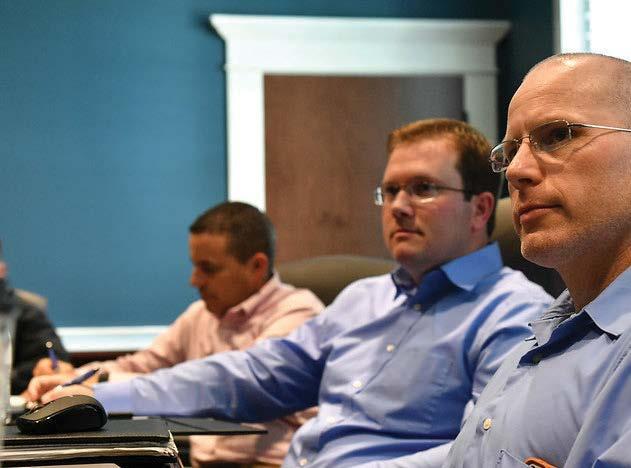

Philippians 2:17a
Everything comes with a price tag, and great accomplishments cost life itself. Sometimes the price is the simple expenditure of days, months, and years: “he spent his life . . .” Sometimes the cost includes forfeiture of life.
Throughout the Middle Ages and into the 1500s, church leaders in England insisted on Latin remaining the language for church and religious study, including Bible reading. This excluded the masses from Scripture and Christian literature. English law prohibited translating the Bible. Authorities thought laymen could not be trusted to interpret Scripture.


William Tyndale disagreed, wondering how anyone could be “so blind to ask why light should be showed to them that walk in darkness, where they cannot but stumble, and where to stumble is the danger of eternal damnation.” Speaking to one steeped in Catholicism, he said: “If God spare my life ere many years…a boy that driveth a plough shall know more of the Scripture than thou dost.”
Tyndale made that famous statement after 12 years of pouring over books at Oxford. Having mastered Greek, he approached the Bishop of London seeking permission to translate the New Testament. The Bishop turned him down. Undeterred, the Oxford graduate left his homeland, traversed Europe, and continued to render Greek Scripture into English. One of his landlords said, “He studied most part of the day and of the night, at his book.” He approached publishers sympathetic to the Reformation and found some willing to cooperate on the dangerous project. His title pages contained fabrications, one listing the publisher as Adam Anonymous, one giving the place as Utopia. Notes exposing errors in the church accompanied his translations.
Those with enough courage smuggled works by Tyndale and Martin Luther into England, hiding books in bales of cloth, sacks of flour, barrels of wine, and chests with false sides. Most got away with it, but authorities caught John Tewkesbury, a “leatherseller of London.” They tortured and killed him.
As Tyndale’s New Testament secretly circulated in England, the same bishop who rebuffed the translator earlier wrote: “Many children of iniquity, maintainers of Luther’s sect, blinded through extreme wickedness, wandering from the way of truth and the Catholic faith, have craftily translated the New Testament into our English tongue, intermeddling therewith many heretical articles and erroneous opinions, seducing the common people.” Sir Thomas More called the translator “a hellhound in the kennel of the devil” and “a new Judas.”
Having landed in Antwerp, Belgium, Tyndale kept a low profile, but authorities were close on his trail. In 1535, a fellow-Englishman and Oxford graduate, Henry Phillips, befriended him. Phillips, however, was no friend. He had been commissioned to find and betray the translator.
About May 21, Phillips lured his prey to a location where officers arrested him. They hauled him to an old prison-castle. After 18 months of confinement, authorities tied him to a stake. Tyndale prayed, “Lord, open the King of England’s eyes.” The executioner received the signal, tightened the chain around the prisoner’s neck, and, upon his death, lit the fire. Tyndale’s great accomplishments carried a great price.
About the Columnist: Paul V. Harrison has pastored Madison FWB Church in Madison, Alabama, since 2015. Previously, he pastored Cross Timbers FWB Church in Nashville, Tennessee, for 22 years. He was an adjunct professor at Welch College for 17 years, teaching church history and Greek. Paul is the creator of Classic Sermon Index, a subscription-based online index of over 66,000 sermons, with clients including Harvard, Baylor, and Vanderbilt, among others: classicsermonindex.com.
 BY HANNAH DRIGGERS MATTHEWS
BY HANNAH DRIGGERS MATTHEWS
Having situated the last chair, I look around and begin my mental checklist. Smart board moved and laptop plugged in? Check. All the chairs scattered in every open spot? Check. Snacks opened and ready to go? Check. I take a deep breath and check the time: five minutes to go. Moving to my place by the door, I get ready to greet the 50 elementary school students who will enter the room.
“Lord, help me share your love today.”
I breathe the quick prayer as the principal begins afternoon announcements. I hand out snacks as the students file in. It’s crazy and loud in our tiny library jammed with over 50 kids, but it’s wonderful and exciting! A salty, a sweet, and a juice box later, we begin the countdown that will start our Good News Club at Scranton Elementary.
I am a public school librarian, and I share the gospel with my students every Monday afternoon. Sounds impossible, right? I’m sure you’re thinking my school or district must be “different,” or that it must not be a true public school. Or maybe you think I’m stretching the truth, that I really conduct an after-school program at my church.
It’s true! Along with a group of teachers, I lead a Good News Club meeting right after public school dismisses, on public school grounds, for public school students. What is Good News Club, exactly? Good News Club is a program sponsored by Child Evangelism Fellowship (CEF) that seeks to “meet children where they are” and introduce them to the gospel. Volunteers are trained and provided materials needed to present Bible stories to groups of students whose parents have “opted in,” allowing their child or children to participate. In the first six weeks at our club, five students decided to follow Jesus!
But let me back up; I’m getting ahead of myself. You should hear the whole story.
I attended public elementary school and a Christian middle and high school. My dad: a pastor and construction worker; my mom: a public school teacher. I honestly had a wonderful childhood, not too sheltered but certainly very godly. Looking back, I see God’s hand at work preparing me for each step. I attended Welch College and graduated with a degree to teach English and reading in 6th through 12th grade. After a few years teaching, I completed a master’s
degree in library science to become a librarian.
As I began my new career, I began to struggle with the attitude so many Christians have towards public school. I read posts on social media and heard rants about how “they’ve taken all the prayer out of schools.”
I understood the statement. After all, my position as a Christian public school librarian can be a precarious one. I encounter far too many children’s books praising and normalizing ungodly lifestyles that surely break God’s heart. While I understand the frustration from so many Christians, it also seemed like we could do something better than be “keyboard warriors.”
I was familiar with Good News Club. My grandparents and other family members had been involved with CEF over the years, and I knew the basics. The timing had never worked out for me to really pursue starting a club — or maybe that was just an excuse.
After my dad passed away suddenly, I transferred schools for a fresh start. The impact of his life sat heavily on my shoulders. He was a man who dedicated every moment to serve Christ and others. He never worried about taking on too much; instead, he always told me he was taking away people’s excuses for not following Christ or going to church.
gave me “boots on the ground” advice and perspective. I learned I needed eight to ten volunteers. Ready to get started (I’ve always been a take-action, think-later person), I talked to my principal and got approval. This is important! It is always best to be on the same page with the administration where you start a club. However, Good News Club is permitted in any public school where any other after-school clubs take place. I applied to Child Evangelism Fellowship and completed the interview and training process. Then I emailed coworkers and asked for volunteers. We all completed the necessary training and planned for our Good News Club. Even better: for the first few weeks, Child Evangelism Fellowship employees came and ran the club to allow us to focus on learning and transportation.
It is easy to be busy doing “church stuff” without really reaching the community.
I knew it was time for me to take a new step. I had always served in the church and felt I was doing a great job. (A word of advice: it’s never good when you discover you are patting yourself on the back.) Then I listened to a Better Together podcast and became convicted. The podcast focused on sharing the gospel with your community. It reminded listeners it is easy to be busy doing “church stuff” without really reaching the community. That hit home! I was teaching a Sunday School class, singing in the choir, and organizing church events, but I couldn’t remember the last time I had shared the gospel with someone.
As I began to pray about it, a group came to our church for a concert. The Heath Brothers have a unique ministry: performing in public schools to share the gospel with students. This was the confirmation I needed. (More accurately, the “kick in the pants” I needed!)
Does any of this resonate with you?
Here are the steps I followed to get started. First, I talked with someone who already led a Good News Club. This
One of the best ways to get students to sign up initially is to have snacks. Not just any snacks, mind you — GOOD snacks! What began with students signing up to get a better afternoon snack quickly turned into them inviting friends because they liked the club so much. My next plan of action is to get my church more involved in the club. We are planning to put Good News Club into the outreach budget. (GOOD snacks are expensive, right, Jon Forrest?) Initially, I am looking for a prayer partner and a snack coordinator. Eventually, I will need more volunteers so my current teacher friends can have a break.
You might be thinking, “But I’m not a teacher, librarian, or school employee.”
Friend, you can kick that excuse to the curb. Most Good News Clubs are organized and run by a group of volunteers from a church. Even if you don’t have any experience teaching a group of kids, you can do it! Good News Club provides everything you need. It might be stressful to start something new and crazy, but you can do anything for an hour, right?
Before you write off the idea, take just a moment to ponder this startling statistic from Good News Club: “After age 19, the probability of accepting Christ drops to just 6%.”
Let’s change the narrative surrounding public schools, one Good News Club at a time!
About the Writer: Hannah Matthews has been a public school educator for eight years, with three of those years in the elementary school library. She loves working on home improvement projects with her husband, Brent. Together they have one (very) spoiled dog named Opie. Contact Hannah anytime with Good News Club questions at thereadingteacher7@gmail.com.
We hope the following articles, written by real-world Free Will Baptist parents from around the globe, will help you grow as parents and as disciples of Jesus Christ.
“My friend texted me yesterday and told me she ‘came out.’” My teen daughter Jane and I were on a morning walk, and I was surprised to learn that about one of her friends in Japan. I felt I suddenly had been shoved into a new level of parenting. To my greater surprise, I learned Jane had already sent a reply—a reply full of love but also truth.
I imagine you’ve had similar conversations with your own teen. I often feel out of my depth because I cannot draw upon a situation like this from my own teenage experience. How do we as Jesus-loving parents navigate these cultural challenges our teens encounter day after day?
Disclaimer: I am not an expert on anything in life, but as I recall that conversation, I am thankful for many things. First, I am thankful Jane responded in love. She reaffirmed their friendship but also told her friend she didn’t support her choice because it is the opposite of God’s way, and His way is best for us. This led to a great gospel follow-up conversation. Finally, I am thankful Jane told me about her conversation.
One of the best ways we can help our children navigate difficult cultural issues biblically is simply to know what they face. We must keep open lines of communication with our kids, and that begins with relationship. We must spend time with our teens and truly listen to them. Most teenagers long to be seen and heard.
Let’s carve out time to listen to whatever they want to talk about. And remember these important guidelines through the conversation:
• Guard against being visibly shocked by the issues they face and listen calmly.
• Avoid “lecture mode” but take your child to Scripture. Knowing God’s Word and valuing it as absolute truth should be a primary goal as parents!
• Keep love at the forefront of every response.
• Remember we all — no matter our age — struggle with sin; some sin is just more public than others.
Hang in there, fellow parents in the trenches! I’m praying for you.
About the Writer: Ashley is wife to Jack and mom to Jane, Callie, and Carter. She lives and serves Jesus in Tokyo, Japan. She enjoys coffee and shopping in second-hand stores.

We teach them to use utensils, cushion their falls, develop social skills, practice driving, and prepare for adulthood. These are only a few things we parents do for our kids. Sometimes, the list seems endless. Obviously, we would never give them a jawbreaker for their first bite or allow them behind the wheel of a car without making sure they know which pedal is the gas and which is the brake. Every milestone moment for our children is surrounded by our instruction and influence.
Why is it, then, that studying Scripture is sometimes forgotten? Not every parent overlooks this important area of instruction. However, many church-going, faithful Christian parents would admit they do an inadequate job of discipling their children by not showing them how to study the Word of God. The result of failing to equip our children is clearly evidenced by throngs of students who walk away from their faith after high school. Sadly, today we have a generation of biblically illiterate young adults who are still infants in their faith. I would argue most Christian parents would never want this to be true of their children.

If you are a student of the Word, wonderful! Pass that gift to your children. Teach them to go beyond just reading the Bible—to dig in, study it, and apply it to their lives. Start small, one verse or passage at a time. Walk through that passage with them. It will be a sweet time together.
I truly believe parents fail to disciple their kids because parents themselves were never discipled. They were never taught how to study the Word of God. How could they possibly teach their children what they do not know themselves? We do not want to send our children into this world and society without equipping them for the spiritu-
al battles they will face (and already face). It is imperative we teach our children how to study and apply God’s Word.
When our kids learn to ride a bike, we walk them through simple steps: training wheels, pedaling, pushing them along to help them balance. Then, we let go and watch them put what they have learned into practice as they pedal away. Learning to study God’s Word is much the same. Take a moment to read Deuteronomy 6:1-2, 6-9 to see how we, as parents, are to guide and instruct our children.
These verses teach us we must embrace the purpose of the Word, the practice of the Word, and the power of the Word. The purpose is so you and the generations who follow you will know and fear the Lord. The practice is every moment throughout your day. What are you doing right now? Turn it into a discipleship moment. You are “holding the bike” as they learn to “balance and pedal.” Make reading Scripture what you do first when you wake up and what you do last before you lay down at night. How about all the moments between? Discipleship moment after discipleship moment. The power of the Word? Eternal impact for generations. Who doesn’t want that? We “let go of the bike” and cheer our children on as they make their faith their own. What a beautiful gift to give our children!
One last thing: if you’ve never been discipled, don’t fret. It’s never too late to grow in your walk with Christ. Don’t let pride or embarrassment (even if you are a church leader) stand between you and a close relationship with God that will help you disciple generations to come. It’s never too late.
About the Writer: Casey Pontious is married to her pastorhusband Aaron and a momma to four boys. Casey loves playing games and sports and also loves crafts and gardening.
Stress is common to all of us. We may express stress in different ways, but we all know the familiar tense reaction to difficult days and weeks. When you feel stress pressing in on you, do you deal with the root cause of your stress or just treat the symptoms? How can we overcome this stress that Satan uses to keep us defeated? As believers, we are meant to depend on God, His Word, and His strength. We must admit we are weak, vulnerable, and not self-sufficient to accept God’s help with our stress.
1. Study the Word. One day, pas tor and best-selling author Chuck Swindoll went to visit his friend Bob at Bob’s office. As Chuck approached the office, he heard the melody, “Come Thou Fount of Every Blessing.” And when Chuck looked through the office window, what he saw made an indelible impression on him. Bob was kneeling in his office before his open Bible. Chuck felt he was standing on holy ground. Bob never knew he was being observed, but his actions had a profound impact on the young Chuck Swindoll, who in turn has impacted the greater Christian community.


Susanna Wesley, mother of 17, would throw her apron over her head when she needed time with her Lord. I’m sure we have all experienced moments like that! Her children knew not to disturb

her during her time spent with God. If you wonder what impact her example made on her children, just read the lyrics of the many hymns penned by her sons John and Charles Wesley. In Luke 10:38-42, Jesus contrasted the choices of Mary and Martha. Do you ever find yourself “cumbered about,” that is, juggling way too many balls at one time? A friend once shared with me, “If I must be a Martha, please give me a Mary heart.” Being busy seems to be my lot in life, like Martha. But I want to know when to be quiet. To kneel in solitude. To “throw an apron over my head,” or to simply sit, like Mary, at the Savior’s feet.
2. Trust the Lord. I’m sure you have seen the saying, “Sometimes the Lord calms the storm; sometimes He lets the storm rage and calms His child.” We have stress in our lives because we live on this sin-cursed earth. There’s no way around it. The good news is, we also know the One who is in control (John 16:33). How often do we come boldly to the throne of God with our problems and petitions, only to take them with us when we walk away? We know God clothes the lilies of the field, feeds the birds, and has our hairs numbered. Why do we struggle to accept that He is also concerned about the things that trouble us? Are we not more valuable than the flowers or birds (Matthew 6:25-34)?
Paul challenged us in Philippians 4:8 to think about things that are true, honest, just, pure, lovely, and of good report. How much of our “thinking time” is invested in these categories, and how much is devoted to worry?


3. Rest. Sleep is a gift from God. How often do we thank Him for this priceless gift? Sleep does for our bodies what nothing else can do. When we are sick or have surgery, we sleep to heal. But when troubled and stressed, do you find yourself spending more hours fretting than sleeping? Does worry keep you awake at night? Tossing and tumbling with your mind racing with the what ifs? Amy Carmichael once said, “In acceptance lieth peace.” This may be easy to say, but it is hard to practice in daily life!
Jesus spent time in solitude with His Father during His earthly ministry. If He, being God, needed to be refreshed, how much more do we need rest and refreshment? We must rest knowing God is in control and does all things well.
4. Encourage others. Philemon 7 tells us Philemon ministered to Paul, and Paul in turn ministered to us through his pen. Who have you refreshed? Share what God is teaching you. They may desperately need what you have learned or are learning. Do you have an accountability partner who will love you regardless of anything you discuss? We all need a close friend who can see more clearly than you when you are surrounded by trouble, a friend who will guard your confidences. Thank God for such a friend and ask God to make you such a friend to others. Romans 16:1-2 briefly describes Phoebe as a sister, a servant, and a succorer (a great help). Let’s follow her example.

5. Strengthen the inner person.
Step back from routine and refocus your priorities. Are you spending time and effort on things that ultimately do not matter? Or are you spending time on things that will strengthen you, build up your family,
What brings you relief, enjoyment, and pleasure? Make some of these relaxing activities a priority.
Balance is key. Work hard when it is time to work and then enjoy relaxation and recreation. It’s easy to feel guilty when more always waits to be done. But we will never get everything done. We must do our best and trust God with the rest.
• Study the Word.
• Trust in the Lord.
• Rest.


• Encourage others.
• Strengthen the inner person.
• Serve others.
6. Serve others. When you serve others, you cannot be self-centered. Selfishness and service do not occupy the same “heart space.” If we model Jesus’ servant heart, we will develop a sensitive spirit. We will listen and not always talk. We will be available when needed. When we become “others-focused,” our own problems do not seem so overwhelming.
Triumph over stress in this fast-paced world is found in a quiet heart. We must pursue and develop a heart focused on God in a vessel (life) fit for the Master’s use. May God help each of us as we develop such a heart.
About the Writer: After serving as an educator and administrator for 29 years, Elizabeth Hodges served as the sixth executive director of WNAC, the Free Will Baptist women’s ministry department, from 2010-2021.
Imagine receiving an all-expense-paid vacation to the coolest place you’ve ever seen. Where is that for you? Big city? Hidden beach? Cabin in the mountains? Oh, but there’s a catch. You must ask a random stranger for directions. You can’t use your cell phone or a map, just the directions you’re given. Would you still go on the trip?
Some of you are still on board. I will be your biggest cheerleader! However, I’m guessing most aren’t taking this offer unless there’s a guarantee you will get where you want to go.
Let me change the scenario. The stranger you ask for directions is from the place you are going. He is riding with you, with a cell phone and a map to help you get there! Now, we are all on board.
Each summer at IM, we meet students in high school, college, and beyond with an end goal in mind. Some have a clear idea how to get there. Some are figuring it out as they go. One thing is certain: all need guidance. Wherever you (or your students) are, IM wants to help you get where the Lord is leading you. Along the way, we hope to open your eyes to what this looks like as a missions-minded believer. The primary way we do this is through our student programs: ETEAM, CMP, and OA.
ETEAM, a missions program for high school students, has been around since 1992. ETEAM accepts students from across the U.S. and sends them to work alongside IM missionaries around the world. Teams spend a week training. They learn teamwork. They also attend classes to help them deepen their walk with the Lord and learn more about Him. Classes taught this past year were How to Study Your Bible, Apologetics, How to Memorize Scripture, Difficult Conversations, Philosophy of Missions, and many others. After the week of training, students spend two weeks doing shoulder-to-shoulder ministry with our missionaries. To say ETEAM is life-changing is an understatement. But don’t take my word for it. Hear from one of our ETEAM 2023 students below!
Since I was part of ETEAM, I have discovered my love for serving and missions! IM does such a great job of introducing field mission work to high schoolers. The hands-on work impacts all students who get to experience it. The relation-
ships you make with the missionaries and the people you meet on the trip can last a lifetime and make such an impact, as they have done with me. I don’t know if I want to pursue full-time missions work in the future; but I am absolutely willing and glad to if the Lord calls me!
—Julia BarnhillCollege Missions Program (CMP) is designed for collegeaged students. Started in 1969, this is our oldest sending program at IM, previously known as Summer Missionaries and Go & Be. CMP allows college-aged students to experience missions in a way that helps them determine if they really could serve overseas. This means smaller teams, more responsibility, and more time overseas. Ultimately, these students experience and learn how to use the “mundane” overseas. For example, a CMP student has a Tuesday afternoon free. How can he or she choose to spend that time wisely for ministry? Hear more from an alumna of both ETEAM and CMP on the impact these programs can have on your life!



I am currently a student at Welch College majoring in Secondary Mathematics Education and minoring in Intercultural Studies. I participated in ETEAM and CMP, going to Chicago, Brazil, and Japan. I have always been fascinated by missions, but the opportunities IM has given me have allowed me more knowledge and experience about missions and what a mission field looks like. I am currently praying for clarity as to where I will work and what that will look like. Being involved with the people in the IM office by being an intern there, has helped me build relationships with previous missionaries and people who are knowledgeable in the field. I am grateful for IM and all the people who have had such an impact on my life. I can only hope to make such an influence in the lives of others.
— Emily RoachOverseas Apprenticeship (OA) is an extension of the CMP program and is traditionally used for academic credit. Most OA students serve overseas for seven to ten weeks. For many, this time is used to determine where they would like to serve after graduation. Silas, one of our most recent OAs to

Bulgaria, saw the Lord use him in incredible ways.


 BY LESLIE NICHOLS
BY LESLIE NICHOLS
IM has been instrumental in developing me as a young man and giving me the resources to grow into who God is calling me to be. Ever since my time in high school, members of the IM staff have continuously invested in me and given me the connections needed to make much of my present season in life. While attending Welch College, IM has never made itself distant! I have had calls with various field workers and many meetings with the office staff, and I have utterly benefitted from their constant encouragement and counsel in my life. As I look towards graduating this spring, these incredible individuals I have had the privilege of knowing have come beside me in prayer as I ponder what God has for me next.
— Silas HouserSometimes, though not always, the Lord uses these programs to speak to a student’s heart and lead him or her to a life of overseas service.
I recently got the chance to visit with a missionary family I met while I was on ETEAM France back when I was in high school. While with them, I had the opportunity to thank them for their impact in my life. Today, as a career missionary, I look back on my journey to get here, and the path was filled with encouragement from so many others involved in missions: Hanna Mott, Joni and Heath Hubbard, Donnie and Ruth McDonald, Matt and Cristina Price, Jerry and Barb Gibbs, and so many more. Without ETEAM and the impact it had on my life and the ability to have meaningful conversations with so many encouragers, I wouldn’t be where I am today.
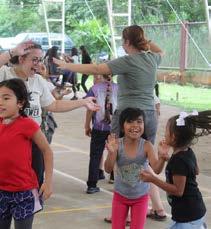 — Lauren Riggs
— Lauren Riggs
It’s not realistic to think every student who goes through these programs will end up serving overseas in a long-term capacity. Some do, and that’s great! But we trust the experience these students gain through their training and time overseas will encourage them to look at life through a different lens than before. As my friend and colleague Danny Gasperson says, we are not called to be believers who simply mind missions, but rather, we are called to be missions-minded believers.
Wherever life takes you, and wherever that all-expense paid dream vacation is for you, it is our prayer you do not try to figure it out on your own. You have a friend in IM! We want to help you “labor with the Body of Christ to fulfill the Great Commission.”
About the Writer: Leslie Nichols joined the IM family in January 2019 as the assistant to the director of mobilization. In January 2021, she became College Missions Program (CMP) coordinator and accepted her current role as director of mobilization in January 2023. Learn more about student missions opportunities: iminc.org/student-missions
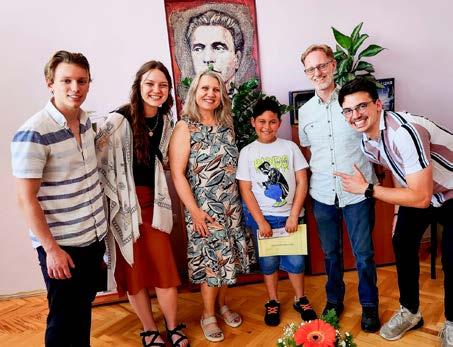



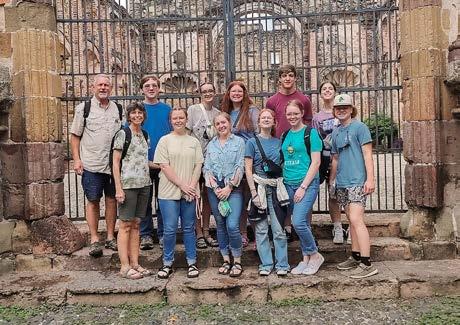


I’ve had the privilege of working with ETEAM in some capacity for the past ten years. ETEAM is IM’s mission program for high school students. Students spend a week in training and close to two weeks serving on a mission field. It has been a joy to work with this program. I have worked at registration, presented seminars, taken notes, answered questions from parents and students, and prayed.
But my greatest role in the program was as the parent of an ETEAMer. My daughter Tori spent three summers participating in mission trips. Those experiences changed her life and mine as well.

Every year Tori applied to ETEAM, I asked God to send her where she needed to go. I was never involved in selecting where she was sent, but God sure was. Every country molded and shaped her for serving God as an adult. Her first year, she went to Tokyo, Japan. This was Tori’s first time out of the country without her parents. I was a little nervous, but I knew the missionaries she was visiting (Donnie and Ruth McDonald) would take good care of her. Tori and their daughter Caroline had attended school together during one of the McDonald’s stateside assignments. It was good for Tori to see her friend serving in Japan. That summer, Tori learned the Japanese people did not have physical needs, but their spiritual needs were great.
The next year, Tori went to France with Jerry and Barb Gibbs. My daughter would never tell you, but she is musically talented. She can play the piano well and sings beautifully. The France ETEAM was a musical team, and they spent their time singing in various areas of France. When Tori returned, she had a new confidence in her musical abilities. My reserved and sometimes timid daughter came back ready to sing at church. I really think this trip gave her the confidence to try out for (and make) a singing group when she was in college.
During her final summer, Tori traveled to Haiti, and the trip rocked her world. She grew up in Middle Tennessee. Her comfortable life had not prepared her for the poverty she experienced in Haiti. She had to adjust to the tropical heat, unusual smells, and riding for hours in a vehicle without air conditioning on unpaved and winding backroads. This trip was the most physically grueling, but I think it also changed her the most. She taught herself how to play the ukulele, made lifelong friendships, and had her eyes opened to the extreme poverty in the world. She also experienced God’s hand of protection when riots broke out around them.
Was everything perfect and wonderful on these trips? No. Teams experienced the drama that happens anytime you put a group of teenagers together. She encountered missed flights, lost luggage (that took forever to get back), and vi-
olence. One summer, she returned home with nightmares that kept our family up many nights. We were unsure what to do, but God used our pastor when he visited our home and prayed with us all. His simple act of kindness demonstrated to my daughter she mattered to our pastor and church. ETEAM also changed my own prayer life.
For years, I heard Neil Gilliland share a warning with parents before dismissing the opening program of ETEAM. He told them to hug their children and say goodbye well; the student they said goodbye to would not be the same child who returned. His statement is so true. After each trip, Tori returned a different person. Did she still have normal teen issues and struggles? Of course! But she came back each summer closer to God and changed in wonderful ways only attributable to God’s work in her.
I always thought Tori would become a missionary. As the years passed, I began to think I was mistaken. But God’s timing isn’t my timing. Just a few months ago, my daughter and her husband Cody (Matlock) became church planters (missionaries) for Free Will Baptist North American Ministries. As they begin their exciting new adventure, I look back and see ETEAM was an instrumental part of my daughter’s journey to this point.
If you are a parent struggling with letting your children participate in ETEAM, please let them go. Yes, you will shed some tears, perhaps endure some long and sleepless nights, and pray a ton of prayers on your child’s behalf. But it is all worth it. Please let them go, give them to God, and watch Him show up big in their lives…and yours.
If you have any questions, or maybe just need to talk to a former ETEAM parent, please call the IM office. I am happy to talk or just to listen.
About the Writer: Jen Thomsen has worked with IM since 2012 and serves as assistant to both the general director and the director of field ministry personnel. She and her husband Eric attend Bethel FWB Church in Ashland City, Tennessee. Jen enjoys dark chocolate, baking, shopping, exploring new places, quilting, and walking her dogs—Wrigley and Honey.

Bulgaria— Jacob and Hailee Voltz arrived in Bulgaria December 14, 2023. Their daughter Aurora was born February 8, 2024.
Spain— Keren Delgado departed for Spain January 2 to begin her ministry in Villanueva de la Torre.
France— In southern France, Shane, Joy, and Jacob led and participated in a community Christmas choir December 3 and 10, 2023. More than 700 people heard the choir sing traditional English Christmas carols, with the Good News in English and French.
Japan—The Carneys reached full funding in December and returned to Japan January 16.
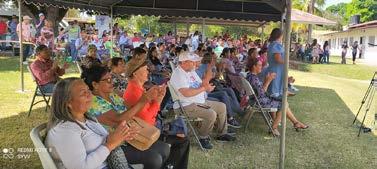
India— Pastor Stanley Rajkumar from South India announced nine people were baptized at Calvary FWB Church in mid-January. February 4, a new church began at Ooty in Tamil Nadu province.

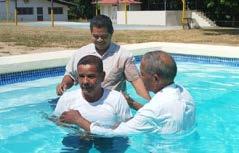
Panama—The Chame FWB Church in Panama baptized eight people on January 28, using the new pool on the seminary campus.
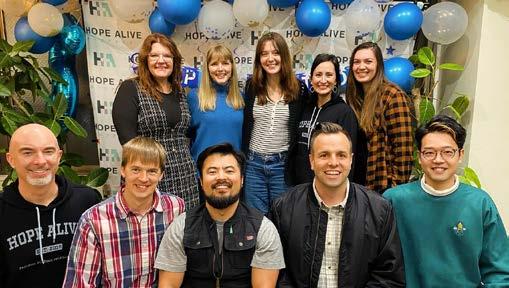
Panama—The Panamanian National Association met January 13-14 at the Free Will Baptist seminary in Chame. Business, worship, and testimonies filled the time.
Japan— Hope Alive Church in Tokorozawa, Japan, celebrated its fifth anniversary January 21.
IM recently introduced the 2024 WMO theme: “Embracing the Legacy, Continuing the Mission.”
Throughout the year, IM will take supporters back to when IM missionaries pioneered works around the world. In addition to sharing stories from the past, supporters are invited to continue the mission of IM missionaries and partners as they reach into new areas. As each person

does his or her part by giving to the WMO, the gospel can continue to go forth.
Learn more: www.iminc.org/wmo.
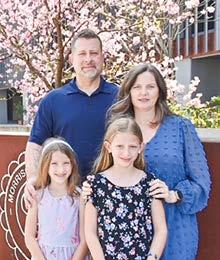
Antioch, TN— Darren and Dana Portell will join Tyler and Kellie Penn in Champaign, Illinois, ministering to international students.
Darren said, “God has created an opportunity for us to possibly serve four of our Morrison Academy alumni who now attend the University of Illinois. Five hundred of the 12,500 international students at UI are from Taiwan, where we served for the past ten years. We are excited to see how God uses our love and understanding of their country and culture to draw them to Himself.”
“Kellie and I are super excited the Portell family will join us





in reaching out to international students at the University of Illinois,” noted Tyler Penn. “Their years of mission work in Taiwan will be a great asset to the ministry to our students. We know the Portells’ experience serving on three continents combined with their heart for the nations will be an enormous benefit to the ministry here.”
The Portells joined IM in 2002 as members of a team working with North Africans in France. They faithfully served until the Lord moved them to Morocco to teach students at George Washington Academy. When God closed that door, He opened one at Morrison Academy in Taiwan. Darren developed the sports program through his athletic director role. Together, the coupled mentored students.



When I consider thy heavens, the work of thy fingers, the moon and the stars, which thou hast ordained (Psalm 8:3).

My parents were my teachers. They homeschooled me and my four younger siblings from first grade through high school. At age nine or ten, my mother began to teach us about astronomy. We learned to identify the constellations of the northern hemisphere: Orion, Ursa Major (the Big Dipper), Ursa Minor (the Little Dipper), the Pleiades, and others. On clear nights, we gathered our astronomy books with their star maps, a flashlight, and an old, ragged quilt my grandmother had sewn years earlier. We divided these items up and headed out into the pastureland around our small home.
After finding a nice level patch of ground free from large rocks and cow pies, we unfolded our quilt on the dewy grass and laid down to study the stars. To my knowledge, no mystic or philosopher ever said, “To look at stars you must first close your eyes.” But they should have. When looking into the night sky, you should close your eyes for at least a minute to allow your eyes to adjust. Some stars, such as Betelgeuse (in the constellation Orion), are so bright they can be seen in most circumstances. However, to see most stars visible to the naked eye requires preparation. While lying in the field with my eyes closed, I could hear bullfrogs in the cow pond down the valley and innumerable crickets in the grass around me. I could feel cool, damp air on my face. I sometimes imagined what it would feel like to gather dew as a blade of grass. And I always anticipated what I would see when I opened my eyes.
Finally, the long minute passed, and I opened my eyes to gaze into the infinite depth of the night sky. That sounds cliché, but sometimes clichés say it best. For the sky is bottomless — infinitely so. I always forgot that, but when my eyes slid open, I suddenly found myself staring into eternity.
The experience never failed to stir something deep within
me. I suppose it must have done the same for my brothers. Though we were ever driven by irresistible impulses to pinch, punch, and prod one another mercilessly, in those quiet moments under the firmament, we were, for a time, stilled. It seemed eternity somehow entered our finite beings. The infinite expanse above us was ruled by order and stability. Each star had its place. Nothing was ever amiss. Polaris was reliably just slightly askew of true north, making his slow way around the top of the world, always happy to help you find your way. Orion never rose without his sword drawn for battle, and the Big Dipper persistently pointed to the Little Dipper. Planets moved about in the sky but always where expected. The order of eternity pressed itself into me. For those brief moments, I felt the immutability of God and the structure of His thought as if tactile things. It was there in the sky, written in letters too big to miss but too small to be noticed without concentration or perhaps meditation. Astronomy slipped into theology. How could this be?
For the invisible things of him from the creation of the world are clearly seen, being understood by the things that are made, even his eternal power and Godhead; so that they are without excuse (Romans 1:20).
In the beginning, God created everything by speaking it into existence. Moreover, as Apostles John and Paul explained (John 1:1-3; Colossians 1:16), He created all things by and through Jesus Christ: the Logos. John’s use of the term Logos in the opening chapter of his Gospel was purposeful. He described Christ as the fullness of God’s ordered thought communicated to man. Christ is the fulfillment of God’s revelation received in two ways: through the created order (general revelation) and the Scriptures (special revelation).

Of course, the Apostles were simply expanding and clarifying what God already explained in Genesis 1. There, we learn God’s spoken thoughts brought the entire cosmos into existence. Unlike the gods of the pagans, who supposedly fashioned the universe from other substances, the Bible depicts God imagining and then bringing everything into existence out of nothing — ex nihilo — through the power of His word.
This revelation of God’s creative process gives us insight into how and why we perceive order in the universe. Abraham Kuyper explained that because of God’s creative work through the Logos, “the divine thinking must be embedded in all created things.” In fact, “there can be nothing in the universe that fails to express, to incarnate, the revelation of the thought of God.” The order we observe in the heavens and in the atom is an embodiment of the divine order of God, so “the whole creation” serves as a “visible curtain behind which radiates the exalted working of this divine thinking.”1 Thus, we are confident the perceived structure and orderliness of the universe is real and knowable (albeit imperfectly) by man.
General revelation is not limited to believers; it is a common grace enjoyed by all. Paul explicitly states no one has an excuse for sinfulness because God has so clearly revealed Himself to us through creation (Romans 1:18-20). Even pagan peoples, according to God’s common grace, have imperfectly perceived portions of the truth about the order of the universe, the coming judgment of mankind, and God’s invisible attributes, among other things. The Pythagorean school of Greek philosophers provides a particularly excellent example of this truth. By observing the mathematical order of the universe, from musical intervals to the regular paths of the stars, they perceived that reality is structured in a specific way that calls man to order himself in harmony with the music of the spheres. Therefore, they worked to cultivate their souls toward virtue and self-control.
This does not mean the Pythagorean philosophers properly understood the relationship of the spiritual to the mate-
1 Abraham Kuyper, Wisdom and Wonder: Common Grace in Science and Art, ed. Jordan J. Ballor and Stephen J. Grabill, trans. Nelson D. Kloosterman (Grand Rapids: Christian’s Library, 2011), 39.
rial world, the nature of the final judgment, or the gift of salvation through Christ alone. However, they perceived the Logos that carefully and harmoniously structured the universe and realized humanity does well to order our lives in sympathy with the framework of reality.
Three decades ago, as I lay under the stars in my little corner of Robertson County, Tennessee, I experienced the Logos, not unlike the Pythagoreans. However, I also had the benefit of God’s special revelation. The physical interaction with God’s transcendent order served as a bulwark for the instruction I was receiving from God’s Word at home and church.
In more recent years, the stars have served to remind me of the truths of God’s presence, power, and steadfastness. For this reason, I always try to keep them in sight. Unfortunately, light pollution in most densely populated areas washes out the night sky, and only the brightest stars shine through. This sad reality deprives us of a key aspect of God’s communication to us. For this reason, our family has been committed to living in the countryside.
Several years ago, our family traveled to a relatively small city for the National Convention. It was the first time our six-year-old son had spent more than an afternoon in a city of any size. A few days into our stay, he told his mother and me he was ready to go home because he missed seeing the stars.
Few things have warmed my heart so much. I was glad he missed the stars because I knew they were teaching him deep truths, they would help him stay on course, and ultimately, they will help him find his way home if ever he should stray.
*Adapted from an essay on HelwysSocietyForum.com.
About the Writer: Phillip T. Morgan lives with his wife Megan and their five children on a small farm in Robertson County, Tennessee. He is the History Program Coordinator at Welch College. Phillip is currently pursuing Ph.D. studies in history at Kansas State University (ABD) and holds degrees from Middle Tennessee State University (M.A., History) and Welch College (B.S., Music Performance, Biblical Studies).

“And I sought for a man among them, that should make up the hedge, and stand in the gap before me for the land, that I should not destroy it: but I found none” (Ezekiel 22:30).

In ancient times, people built walls around their towns for the same reason we lock our doors at night — protection. God revealed to the prophet Ezekiel the wall of righteousness protecting the people had been destroyed, and the nation was in trouble. The same is true for Bulgaria. After five hundred years of Islamic rule and fifty years of communism, the wall of righteousness guarding Bulgaria is in shambles.
A small stone wall in our village needs to be rebuilt. Over the years, it slowly has fallen apart. Now it’s more a pile of stones than a wall; it needs to be restored. For those of you who haven’t had the privilege, building a stone wall is neither a quick nor an easy task. (I think this is one of the reasons most houses in the United States don’t feature stone walls.)
The most important part of any stone wall is the foundation. Without a solid base, the wall will eventually topple. However, foundation work is the most unsatisfying part of the job. No one will ever see it. It is both the most important and the most underappreciated.
The foundation of a wall and the foundations of faith have similar characteristics: underappreciated, often overlooked, and vital to stability. Perhaps this lack of attention to discipleship has led to crumbling walls of faith among us.
In Bulgaria, the minute someone makes a profession of faith or shows interest in growing in the faith, he begins a Discipleship Essentials course with a mature believer in the church. A shallow foundation of faith has only one outcome, and it is never good. The main question is how long we want our wall of faith to stand. In this area of Europe, I have seen strong, effective walls dating back to when North Carolina was still inhabited by the Catawba Tribe, and no European had ever planted corn. I’ve also seen some modern walls that last only until the next heavy rain.
Discipleship — foundational work — is neither quick nor easy. Honestly, at times I get discouraged. The hard work of discipleship is often unseen and far from glamorous. Yet, one day I hope someone will pass by a wall of faith in someone’s life for which I have helped set the foundation. On that day, I hope they have the same feeling I have when I see an old stone wall that has stood the test of centuries. I stop in amazement, awed by the discipline and tenacity it took to build the wall.
Let the walls of faith in the lives of others be our legacy.
About the Writer: Tim and Lydia Awtrey have been serving in Bulgaria for 15-plus years.Being a nurse and working in healthcare is not as glamorous as some portray it to be. The job includes hard nights and early mornings helping people through some of the worst times in their lives. Being great in healthcare requires hard work and determination. Transitioning from being a full-time bedside nurse into a professor of nursing education, I have had concerns about Generation Z.
Have you been around Generation Z? Have you heard what is said about them? Soft. Snowflakes. Unwilling to grow up. They dislike communication.1 These are the words and phrases used to describe Gen Z. But are they true?
What if we flip the script? Turn this around and hear other things said about Generation Z: independent learners, resourceful, the most educated generation. They provide an inclusive culture, bring values and beliefs into the workforce, have a voice, and are entrepreneurs.2 They have figured out easier ways to complete various tasks. They are working smarter.
Travel back in time and consider the people who brought healthcare to this point, perhaps two centuries ago. None of us were around, but think: what was surgery like then? What did healthcare look like? What did people do when they became ill? Recall with me a few world changers. In 1850, a woman named Florence Nightingale cared for those injured in the Crimean war and sparked the profession of nursing. In 1903, Marie Curie studied radiology. She won a Nobel Prize in 1911 and sparked the profession of radiology. In 1928, Alexander Fleming discovered the world’s first antibiotic.
1 M. De Witte, “Gen Z are not ‘coddled.’ They are highly collaborative, self-reliant and pragmatic, according to new Stanford-affiliated research”, Stanford News, January 2022. Accessed: news.stanford.edu/2022/01/03/ know-gen-z/
2 Ibid
Now, fast-forward: what if, in 2050, someone from Gen Z finds a cure for Alzheimer’s? Or in 2042, someone from Gen Z invents a new surgical improvement resulting in a three-month recovery for ACL repairs? What if, in 2030, every school in the United States has Gen Z athletic trainers? What if, in 2038, someone from Gen Z spurs on the research that leads to a cure for cancer?
How does Gen Z have a role to play in healthcare? Think about the attributes listed above. How could healthcare be affected by a student who is not only Gen Z but also a believer? Gen Z can be world changers through healthcare in the following ways.
Acts of Service. This generation is characterized by inclusivity. As a reminder, Jesus was the greatest servant who ever lived, no matter the character of those He served. In Matthew 9:10-13, we read the account of Jesus eating with tax collectors and sinners. Jesus came for sinners. Gen Z can serve their patients to show them the life available in Christ. Doctors serve patients through diagnosis and treatment. Nurses serve patients through advocacy and quality care. Physical therapists serve patients by leading them as close as possible to 100% recovery after injury or illness. Radiologists serve patients by early detection of injury or illness. Psychologists serve patients by listening and advising. In a world that often seems uncaring, Generation Z can change the world through acts of service and a culture of inclusivity.
Providing Aid, Both Physically and Spiritually. Since this generation has been the most educated, they can provide better aid. Healthcare professionals encounter patients experiencing some of the worst (and best) moments of their lives. The aid they render may help patients through a difficult diagnosis or rehab from an injury to

How could healthcare be affected by a student who is not only Gen Z but also a believer?
return to a sport they love. Their aid may help detect illness before it spreads. Gen Z can use their education and knowledge to expand and improve the aid offered in the future.
Integrity. Those working in healthcare are thought to be among the most trustworthy of people. Christian members of Gen Z can bring Christian values and beliefs into the workforce and positively change healthcare. What will healthcare look like with thousands of Gen Z believers working? Healthcare professionals should protect individuals and help them remain safe and healthy, and I pray believers of this generation will be at the forefront.
Advocacy. They can be advocates for change. They can stand up and champion patients who have no voice. Advocate for clients when it seems like their backs are against the wall. Be bold in advocacy and promote change that propels healthcare forward. Gen Z can push for what is right, just as Jesus did.
Innovation. We will always need healthcare. It isn’t going anywhere. Is Gen Z willing to take on the challenge and be innovative in the fields of medicine, physical therapy,
nursing, and psychology? Generation Z is resourceful, entrepreneurial, and independent in their thinking and learning. In whichever healthcare profession they choose, their innovation can change the world.
Two centuries from now, someone from Gen Z could be the healthcare hero people are still talking about, the one whose innovations and creativity changed the course of healthcare. Maybe this generation will be known for its decision to take Jesus into every avenue of healthcare. Gen Z could lead hospitals across the country, pioneer research around the world, and spur on the cure for terminal diseases. Gen Z could work the sidelines at our schools and colleges to keep our athletes healthy.
As we emerge from the pandemic, many news articles describe healthcare workers as the greatest heroes of today. What if Gen Z is the best generation of healthcare workers in history? I believe with the right push they very well could be. Gen Z, are you ready to step up? Accept the challenge to be world changers in healthcare!
About the Writer: Katie J. Bryan, MSN, RN, teaches at Union University. She is the nursing representative for Welch College and the Welch College women’s head basketball coach. Learn more: welch.edu.
Mr. Joseph “Sandy” Goodfellow, Welch College’s former director of plant operations, passed from this life January 4, 2024, after a year-long battle with Leukemia.
Goodfellow retired in 2019 after nearly forty years of service to Welch College. A fixture on the campus, he came to Welch as a student nearly five decades ago, and for most of the time since, he dedicated his career to seeing that the campus of Welch College ran smoothly and safely.
President J. Matthew Pinson offered the following remarks:
Mr. Goodfellow is an example of our institutional purpose statement: Welch college exists to “fulfill the traditional Protestant vision of the sacredness of Divine vocation.” That word vocation, from the Latin word vocatio, means calling, a divine calling from
God to a particular task. Mr. Goodfellow exemplified that for us here at Welch.
I witnessed firsthand his service to Welch over 17 years. It was marked by diligence, hard work, and dedication. Many were the late nights and early mornings when a transformer went out, the phone system malfunctioned, or the server had problems. There was never a question in my mind that Sandy Goodfellow would be right there, always
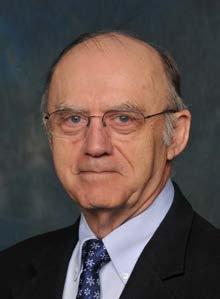

reliable, to make sure the plant operations of Welch College continued to run without a hitch.
It’s because he knew this was necessary for this ministry to do what God called us to do with excellence as we changed lives for service to the Kingdom. Mr. Goodfellow saw his service to Welch as just that — changing lives for Kingdom service.
I think Mr. Goodfellow could have retired earlier. But I always sensed he felt it important for him to stay through the transition to the Gallatin campus and make sure everything went smoothly. I deeply appreciate him for doing that. Indeed, his wisdom and expertise proved invaluable again and again as we worked through the sale of our old campus, the construction of the new one, and the transition from the West End campus. Many were the consultants, realtors, contractors, and inspectors with whom Mr.
Goodfellow worked professionally and excellently and made such a good impression on for Welch College.
Mr. Goodfellow’s dedicated service to this college for almost four decades is the result of his character qualities of honesty, integrity, and hard work, which resulted from his deep faith and dedication to serve God. This was seen in his love for his wife Dari and his family.
Mr. Goodfellow kept us going on the old campus, he was in the center of the construction and transition to the new campus, and the campus of Welch College will always bear his mark. Part of him will always remain here until our Lord returns.
Celebrations of Goodfellow's life were held in Arizona and Tennessee.

William Slater, dean of adult and online studies at Welch College, has been awarded the 2024 Harold Bradley Legislative Leadership Award by the Board of Directors of the Tennessee Independent Colleges and Universities Association (TICUA), according to Welch President Matt Pinson. The award is presented to state legislators who have shown distinguished support for higher education.
“Serving in the Tennessee legislature is a great honor,” Slater said. “I am humbled to be recognized for the work accomplished for the benefit of students enrolled in independent colleges and universities in our state. TICUA member institutions, like Welch College, provide import-
ant educational choices and opportunities for our citizens. It is a joy to be a voice for them in the General Assembly.”
Slater serves part-time as the representative for District 35 in the Tennessee State House of Representatives. In addition to holding this position, he has been broadly active in the civic and community life of Sumner County and is a proponent for the advancement of higher education.
“We at Welch are so thankful for what William Slater has brought to us as dean of adult and online studies at Welch College,” Pinson said. “He does such an excellent job in his role here, and we’re so thankful to have him representing our interests as vice-chairman of the education committee in the Tennessee House. He’s so deserving of this award.”
The award honoring Slater’s commitment to higher education was presented at the TICUA Annual Meeting Tuesday, February 20, in Nashville, Tennessee.

This article continues the discussion of a groundbreaking new book about the phenomenon of people leaving the church: The Great Dechurching by Jim Davis, Michael Graham, and Ryan P. Burge. In the last issue, we discussed five groups the study identified: cultural Christians, dechurched mainstream evangelicals, exvangelicals, BIPOC (black, indigenous, and people of color), and dechurched mainline Protestants and Catholics.
In part two, I’ll share suggestions from the authors for dealing with the problem of the dechurched. Then I’ll offer 22 strategies any church can employ to keep people from leaving the church and to reengage the dechurched.
Let me be clear from the outset. The thrust of this book is not about attracting the dechurched with things that appeal to consumer desires. The problem is much more profound than that.
As a Religion News Service article recently noted regarding the dechurched:
The Great Dechurching suggests that contemporary American life is actually antithetical to religious values. Contemporary American life does not promote mutuality, care, the common life, or the common good. Rather, what is the focus of American life? Radical individualism. Consumerism. Buying and owning what it is that makes you feel good. The promotion of individual accomplishment—professional and financial success.
If it doesn’t contribute to your professional life; if it doesn’t contribute to your financial success; if it doesn’t contribute to your personal happiness or fulfillment; if it doesn’t contribute to your children’s academic or professional prospects—the sad truth is that we have precious little time or energy for it.
Many Americans have adopted a way of life that has left us lonely, anxious, and uncertain of how to live in community with other people.1
Engaging the dechurched is about methods reaching the heart of spiritual things, not the typical attractional model of getting people interested in church because it meets consumer needs better met elsewhere.
Section three of the book suggests how churches should go about reengaging the dechurched. The authors suggest “reasons to hope,” that things are not as bad as sometimes thought in terms of dechurched opposition to basic Christianity. The authors were surprised the dechurched remain as orthodox as they are but also expressed alarm at how little emphasis most churches place on doctrine, theology, and other confessional concerns historically at the core of being Christian.
1 Jeffery Salkin, “REM was right. We are ‘losing our religion,’” Religion News Service, Accessed: https://religionnews.com/2023/09/18/religionchurch-unchurched-nones/
Evangelicals are trending toward a radical de-emphasis on doctrine, teaching, and training, including de-emphasis on confessional beliefs attached to a given denomination or tradition. This trend runs counter to the reasons dechurched people said they left churches. In fact, the authors’ research revealed this doctrinal shallowness and lack of substance was one of the biggest contributors to people leaving the church. The less grounded people are in the beliefs and practices of Christianity, the more apt they are to leave (121–23).
But side-by-side with questions of “belief”— Christian doctrine, practice, teaching, and discipleship — is the issue of “belonging.” Evangelical churches have lost the ability to make people feel they belong. Recent evangelicalism has been driven by a consumer mentality. The church too often functions as a purveyor of religious goods and services to religious customers in a low-expectation environment. The result: these “consumers” easily get lost in the crowd and simply move on when they stop liking the quality of the “goods and services” the congregation offers. This is precisely the problem (123–27).
One thing this study reveals most clearly: in our uprooted culture of isolation and loneliness, where embodied relationships are on the decline and depression and anxiety are on the rise, where people feel displaced as if they don’t belong anywhere, what people need is for the church to be the church. Free Will Baptists can learn from this. It’s where we can shine. “Church is not an event; it is a family. It’s not a perfect family, but it is a real spiritual family….We can find great community in our golf groups, social clubs, or children’s schools, but that community is different from the belonging we find in a healthy church.” Consequently, the study found the dechurched have much higher levels of anxiety, depression, and loneliness “than those who immerse themselves in their faith community” (125).
What people need is for the church to be the church.
However, when placing more emphasis on community and authentic relationships, it is important churches remain balanced with the priority of Christian belief and behavior. The authors argue the lack of emphasis on clear teaching in all aspects of Christian doctrine and ethics is an important reason behind the great dechurching. These former church attenders indicated the church provided “no real answers to their questions” (126).
But these answers — this doctrine, these ethics — must be communicated in a spirit of love, patience, and humility. “We learned that simply listening better and more consistently embodying the fruit of the Spirit in interactions with children can change everything” (128).
Part 4, “Lessons for the Church,” serves as a poignant reminder of the biblical priorities that may come as a surprise to many accustomed to church growth seminars and cultural-stylistic silver bullets. Those methods are what my friend the late Harry Reeder used to call “cultural steroids” that bring quick growth and strength but leave the church anemic and lifeless in the end.
This aspect of the book is the most refreshing. A Free Will Baptist pastor of 50 people, while feeling convicted after reading this book, will come away with things his congregation can do without the “extreme makeover” church growth gurus too often recommend, and which most churches couldn’t pull off if they wanted to.
This section makes this book so unusual and helpful. The data is fresh social-science data vetted by a respected social scientist, but it has the touch of the pastor-theologian. The authors contrast the “confessional” church with the “missional” church. (Obviously, these are stereotypes into which a single church is unlikely to fit.)
The confessional church gets all the doctrine and practice right but is dead, lifeless, and not outwardly focused; it makes the Christian religion inaccessible. It’s like an insider’s club (the “frozen chosen” or “us four, no more”), and the only people who come to faith are children of the members. This is unsustainable.
On the opposite extreme is the missional church, which prioritizes outreach at the expense of clear teaching of the whole counsel of God. Ultimately this approach is unsustainable. You end up losing more people because they attend for cultural reasons rather than the biblicalgospel things the Spirit says the church is about. When the missional church appeals to tastes and preferences, it invites a consumer experience, not a religious experience. This is also unsustainable.
The authors prescribe a faithful, biblical combination of both the confessional and the missional. This prescription is not either/or but both/and . Without confessional priority (the gospel, doctrine, and practice of Christian faith, with
the depth and transcendence humans long for) wed to missional priority (outward focus on evangelism, discipleship, and people, providing a loving community for lonely, hurting people), we will never stop the hemorrhaging of the church.
The strategies offered can all be carried out by the average Free Will Baptist church. Yes, we must make changes in our attitudes and methods to reach the unchurched and dechurched! But this does not mean an extreme makeover culturally and stylistically. We can do this! It will be hard but well within the reach of everyday Free Will Baptist churches, even smaller ones. The data supports what most other studies have consistently shown over the years about why people leave churches and join churches.
It’s consistent, for example, with Fuller Youth Institute’s recent Growing Young study. Like that study, focused on
reaching young people, The Great Dechurching reveals cultural-stylistic concerns are not really what this whole phenomenon is about. People in all four of the book’s dechurched categories are leaving small and large, rural and urban, contemporary and traditional, denominational and non-denominational churches at the same rate. And not a single reason for leaving (or possibly returning) has anything to do with the consumer-oriented things we spend most of our time worried about in outreach.
The study found nothing about music, worship style, lighting — nothing about our fascination with “cultural relevance.” The dechurched described biblical things, human things, not consumer desires. They described the deepest human needs only Christ, His gospel, and His truth can fill. God can work through both large and small churches to meet these needs.
I returned to each reason the book gave for why the dechurched left the church and what they said might bring them back. The strategies below consolidate each reason into a strategy any church, regardless of demographic, size, or style, can employ. All strategies are first-century, New Testament strategies that can be used in any setting, culture, or subculture.
1. Preach and teach sound doctrine and ethics in ways accessible to outsiders and in ways that address the total personality (intellect, emotions, and behavior) of people today. Train lay leaders to do the same.
2. Intentionally and tangibly demonstrate love and openness to people from different ethnicities, age groups, and socio-economic and educational backgrounds.
3. Emphasize helping the poor and hurting in tangible, observable ways.
4. Be intentionally intergenerational, so individuals from all generations and ages can worship and serve together without feeling excluded.
5. Make sure everything in your church brings people together rather than dividing them.
6. Find out who moves into your community and strategize how to invite them to your church or a men’s/women’s/youth group or Bible study.
7. Work a detailed, strategic plan to show love to people and give them a sense of belonging.
8. Work a detailed strategic plan to guide people into men’s/women’s/youth groups and Bible study groups.
9. Work a detailed strategic plan to foster more hospitality among members.
10. Preach and teach about Christian friendship and community, demonstrating that Christian doctrine and ethics combat loneliness and isolation.
11. Show compassion to divorcees without compromising convictions or biblical teaching on divorce.
12. Make sure the senior pastor majors on preaching and teaching sound doctrinal and ethical truth that deals with the total personality (intellect, emotions, behavior) of people today.
13. Make sure the senior pastor is a humble, caring, shepherding, empathetic person.
14. Take a stand for truth without anger, avoiding a scolding, hard-nosed persona when doing so.
15. Be positive about how the Christian life and ethics foster human flourishing rather than being scolding and legalistic.
16. Preach and teach about being patient and truly listen to those who disagree with biblical truth.
17. Preach and teach about redeeming the time, streamlining their lives, practicing spiritual disciplines, and coping with the busyness of modern life.
18. Be committed to Christian public ethics, but avoid being seen as the Republican or Democratic Party at prayer; de-emphasize party politics from the pulpit.
19. Emphasize Christianity as the religion for those
with intellectual questions; readily offer articles, books, audiobooks, and podcasts to help people who doubt or disparage Christianity’s intellectual credibility.
20. Lead by example, reinforcing the mentality that ordained church leaders are the most humble, ethical, trustworthy, reliable people — people on whom you can count, who won’t let you down.
21. Teach that God and Christian doctrine and ethics meet the deepest human needs and longings.
22. Don’t let people “slip through the cracks.”
These strategies will not be easy, and we’ll have to change a great deal. But the change is the sort of change written in the New Testament: teaching people the faith in the context of rich human relationships; helping the poor; teaching Christ’s doctrine, practice, and ethics — “all things whatsoever I have commanded you”— in the context of humility, love, patience, and all the fruit of the Spirit.
These are the “ordinary means of grace” the Spirit has used across every time, place, and culture, and He promises to bless these ordinary means today. To Him be all the glory!
About the Writer: J. Matthew Pinson is president of Welch College: welch.edu.
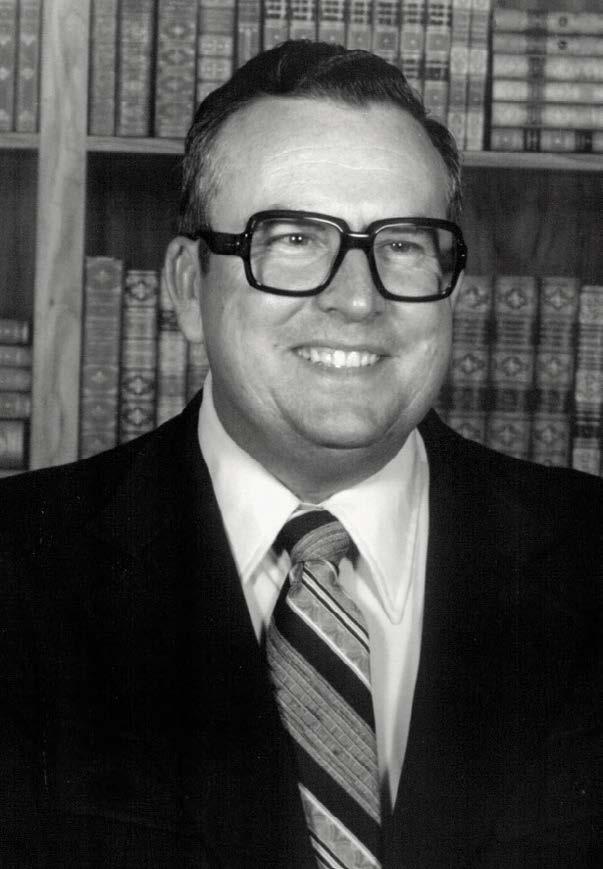
Dr. Alton Loveless became the director of Randall House not long after a downturn in Sunday School attendance in the 1980s led to lean times for Christian publishers. Loveless guided the Sunday School publisher through these difficult days, led the organization into the digital age, and staged the ministry to leap forward in the new millennium. Today, D6 Family Ministry leads the way in generational discipleship through curriculum, books, conferences, leadership training, and CTS — a legacy to the creative leadership Alton Loveless provided.
Why not start your own legacy with an endowment to benefit D6 Family Ministry at Free Will Baptist Foundation?

Free Will Baptist Foundation | www.fwbgifts.com
Quench not the Spirit. Despise not prophesyings. Prove all things; hold fast that which is good. Abstain from all appearance of evil (1 Thessalonians 5:19-22).
We live in a day when “spirituality” is popular. Even while the “nones” (those who claim no religious affiliation) are increasing in American culture, most people still claim to be spiritual, just not religious. Their spirituality can best be described like a buffet at a local restaurant. People pick and choose whatever spiritual “dishes” they like and ignore the rest. In this confusing day, it is crucial for us to test spiritual claims, using three simple guidelines from the Apostle Paul.
1. Don’t quench the Spirit; instead, be sensitive to His leading (verse 19). Paul commanded these young Thessalonian Christians (and us by extension) not to extinguish or quench the Holy Spirit. Fire is often used in Scripture as a metaphor of the work of the Holy Spirit. For example, John the Baptist predicted what would happen in the ministry of Jesus, emphasizing the work of the Holy Spirit: “I indeed baptize you with water unto repentance. but he that cometh after me is mightier than I, whose shoes I am not worthy to bear; he shall baptize you with the Holy Ghost, and with fire” (Matthew 3:11).
The book of Hebrews describes God as “a consuming fire” (Hebrews 12:29). Remember the Old Testament account when God got the attention of Moses? God spoke to Moses through a burning bush that burned without being consumed. Believe me, he had Moses’ full attention! Paul also used the language of fire to challenge young Timothy to “stir up” or to “fan into flame” the spiritual gifts, the unique calling of God upon his life. These examples are all the opposite of what Paul emphasized here in 1 Thessalonians 5:19, when he said not to quench the Spirit. The opposite of quenching the Spirit is being filled with the Spirit, keeping in step with Him and fanning into flame His work in our lives.
Many people today are confused about the Holy Spirit. When do we receive the Spirit? What does He do? The moment we come to faith in the saving work of Jesus Christ, the Holy Spirit comes into our lives. Throughout
our Christian lives, the Spirit works within us to produce holiness, move us to love others, do good works, and cultivate His fruit. We must choose whether to cooperate with His gentle yet powerful influence or to douse His fire within us.
2. Test every spiritual claim against Scripture (verses 20-21a). Too often, we turn this around and test or judge the Scriptures through the lens of our experiences. This is a big difference. Being sensitive to the work and leading of the Holy Spirit does not mean we are naive, unthinking, or quick to embrace anything or anyone claiming the work of the Holy Spirit. Instead, the Spirit Himself calls us to test everything. Does a spiritual experience, message, or claim pass the test of the Holy Spirit and the Scriptures?
We must remember the Thessalonian church lived during a transitional period in salvation history. The New Testament was still being written. Some manifestations of the Holy Spirit remained in effect in those days that are no longer operational today. Among these special, transitional gifts was the gift of prophecies, to which Paul referred in verse 20. Perhaps these young Christians were treating prophecies with contempt. Perhaps some so-called prophecies hadn’t proven true. False prophets existed then, just as they do now (1 John 4:1).
While we no longer have prophecies in the strictest sense of the word, this verse remains applicable. Simply put, we must never divorce the work of the Spirit from the Word of God. God speaks to us today through His Word in settled, written form. Today, we have the Word for instruction and learning. We must beware of the myriad voices claiming to “have a new word from God,” because we no longer have active prophets. Scripture provides all the lessons, sermons, and prophecy we need.
Let’s face it. We live in an undiscerning age. Information overload floods us with news, facts, and figures. And, to add insult to information, more recently we have begun to grapple with fake news. Sometimes, it is hard to filter


out the genuine and reliable from the misleading and false. I suspect we’ve all inadvertently passed along bad info on things like the weather, politics, or the recent pandemic.
We must be cautious not to bring this same practice into spiritual matters. Unlike the Thessalonians, we have the completed Bible, and it stands in perfect judgment over all things. The Bible, correctly interpreted, helps us be discerning in our confusing age. When anyone makes a spiritual claim, whether preacher, teacher, professor, or TV personality, we must study the Scriptures to see if the claim matches the truth of Scripture.
3. Act based on the truth you discover (verse 22b-23). As you test spiritual claims against Scripture, with the guidance of the Holy Spirit, the claim will be revealed as either good or evil. Paul’s point is simple. Cling to what is revealed to be good. Abstain or avoid what is revealed to be evil.
The phrase appearance of evil doesn’t mean avoiding things that may appear evil which, in fact, are not. It is the
idea of avoiding evil in every form. In contrast, we cling to what is good in the biblical sense. God is good — perfectly good — and He alone defines goodness. By extension, He also defines evil. This is a crucial concept to grasp, because Scripture warns against individuals who call evil good and good evil. Rather than allowing God’s definition of good and evil to stand, these people change the categories to fit their own desires.
Consider abortion. Abortion is the murder of the unborn, but today the practice has been renamed a woman’s right to choose. Our culture has labeled abortion good, but you can be sure this doesn’t change God’s view. In this confused “world upside down,” we must follow Paul’s simple formula. Cling to good. Avoid evil. This basic choice determines success in the Christian life.
When learning to water ski as a child, I remember the simple instructions: keep your skis together, legs bent, and arms straight. And when the boat lifts you from the water, remember one other important detail. Hold on! While I can’t recommend hanging on to the rope too long when water skiing (it’s a rough ride across the water), in the Christian life, a tenacious hold on the good is desperately needed. When we cling to the good, when we hang on for all we are worth, reinforcement comes, and our spiritual muscles are strengthened. Discernment becomes stronger.
How much better would our lives be if we followed these simple suggestions from Paul: test everything; listen to the Holy Spirit; rely upon the standard of God’s Word; and cling to good and avoid all evil? Paul answered that question in the next verse. The God of peace will “sanctify you wholly” and “your whole spirit and soul and body be preserved blameless unto the coming of our Lord Jesus Christ” (1 Thessalonians 5:23).
I don’t know about you, but that is how I want to live.
About the Columnist: Dr. Barry Raper is associate dean of Welch Divinity School and pastor of Bethel FWB Church near Ashland City, Tennessee.


“See then that ye walk circumspectly, not as fools, but as wise, Redeeming the time, because the days are evil. Wherefore be ye not unwise, but understanding what the will of the Lord is.”
Ephesians 5:15-17


Walking circumspectly enables believers to discern between the foolish and the wise. Jesus taught us the wise person listens and obeys the words of the Savior, while the foolish person ignores Him and is ruined (Matthew 7:2427). Though the foolish man is concerned with earthly gain, the wise man lives for the eternal, preparing himself for the Lord’s return (Luke 12:16-21; Matthew 25:1-13).
A mature believer will endeavor to walk wisely with the Lord, avoiding foolish and self-gratifying distractions.
“Do you know what your dad is going to do?” The boy answered, “Well, Dad’s still praying, but Mom’s packing!”
We are not truly yielded to the will of God if we have already made up our minds about our direction, and we are only seeking God’s approval. As you walk with the Lord, be directed by His will alone to keep “walking in step with the Savior.”



North American Ministries is pleased to announce the approval of new lead church planters Joel and Viviana Portillo and Armon and Yvette Jorden.

Joel and Viviana Portillo will serve as cross-cultural church planters at Iglesia Nacion Santa FWB, a Hispanic work in Louisville, Kentucky. Before moving to Kentucky, the Portillos ministered faithfully in Fort Myers, Florida, for over a decade. While in Fort Myers, Joel served at Iglesia Ministerio Unido FWB for ten years and pastored Iglesia Nación Santa FWB Fort Myers for the past three years. The Portillos consider it a true privilege to join what the Lord is doing in Louisville to build His Kingdom and change lives. Joel and Viviana have three children: Sebastian, Valentina, and Esteban.
Armon and Yvette Jorden will serve as lead church planters to Hilo, Hawaii. Hilo will be NAM’s third church

Reverend and U.S. Navy veteran Josh Alderman became the newest Free Will Baptist Chaplain October 27, 2023, by joining the U.S. Navy on the deck of the Battleship U.S.S. Alabama in Mobile, Alabama. Josh, accompanied by his wife Tasha and three children, Blake, Cole, and Hadley will begin an active-duty assignment in January when Josh begins Chaplain Corps Training school in Newport, Rhode Island. Josh re-enters the U.S. Navy with the rank of Lieutenant, Junior Grade (LTJG). Please pray for Josh and his family as they serve Free Will Baptists, our great country, and our Savior Jesus Christ.
plant in the state and the first on the big island of Hawaii. Armon is one of the first second-generation NAM planters to plant a new church. He was saved and discipled in a NAM church plant in Grand Junction, Colorado, under church planter Chad Kivette. The new work in Hilo is evidence NAM is reaching the goal of “disciples making disciples.” Yvette was born and raised in Hawaii, giving her firsthand knowledge of the island’s distinctive history, religious challenges, and rich cultural background. Though raised in the U.S., Armon was 30 years old before he first heard the full gospel, making him uniquely aware of the deep spiritual needs within our nation. The Jordens’ knowledge of Hilo and their genuine passion for sharing the gospel will be an asset as they seek to serve their community and reach the lost there.
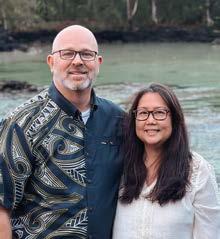
Mason Anderson serves as a chaplain candidate in the Missouri National Guard. He and his wife Courtney are both graduates of Hillsdale FWB College (Randall University) and hold advanced degrees from Liberty University. Currently, 2LT Anderson oversees religious ministries, such as officiating at worship services and other meetings and serving foreign military personnel and civilians, including hospice ministry. The Andersons have two children: Ezra and Emerie.

Please pray for 2LT Anderson and his family as they move forward in obedience to God’s calling to serve our nation and its servicemen and women.
On December 9, 2023, deadly tornadoes developed across Middle Tennessee and Kentucky resulting in multiple fatalities and extensive property damage. Master’s Men Disaster Response Teams (DRT) quickly organized and began assisting with the cleanup effort. Volunteers came from DRTs in Tennessee, Illinois, and South Carolina. The 180 FWB Church in Clarksville, Tennessee, acted as a staging ground for workers and provided a warm place for the community to have access to electricity and supplies.
Master’s Men thanks everyone who gave financially, volunteered time and labor, and prayed for storm victims. The ministry additionally offers special thanks to Master’s
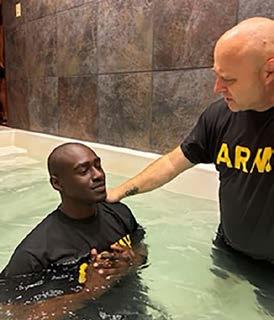
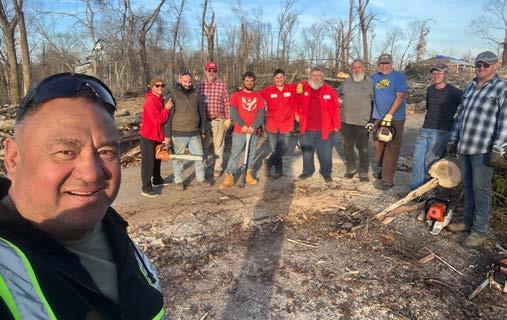
Men volunteers on the ground and Pastor Brian Lewis and 180 Church for their generous hospitality and faithful service to the Clarksville community.
Missouri Free Will Baptist Missions recently shared an amazing update from Fort Leonard Wood. God has blessed the ministry of Chaplain Michael Beatty, and they have baptized over 50 recruits over the last several months. We are thankful for God’s open gift of salvation and for the ministry of Chaplain Beatty and others like him.
Keep praying God will move among military members and more chaplains will answer the call to serve them.
The Church Extension Loan Fund (CELF), a ministry of North American Ministries, has been meeting the needs of churches for over forty years.
NAM’s CELF program receives investments from individuals, churches, or other entities, and then loans that money to churches and ministries to buy land, construct church buildings, or make improvements on existing properties to better serve their members.
As of January 1, 2024, CELF investments earn interest
from 3.5% to 5.5% depending on the investment amount.
This is an increase from past rates. Interest is compounded monthly to give an added benefit to the investor. With only a 30-day requirement for withdrawal, the money is not tied up for an extended period.
If you or your church would like to invest in CELF, contact us at nam@nafwb.org today!
CELF may not be available in all states.

Free Will Baptist Master's Men developed Direction Bible Studies to help individuals and groups discover, understand, and apply what the Bible says by taking a journey into its pages and principles. These studies will give your men a map to follow on their journey through life!
In the same way, our small financial contributions grow into something much bigger — providing us with the ability to sustain ourselves in retirement while blessing and ministering to others.
Reach out today to get started. We are here to help!

I remember going into my first ministry position as a freshman in college. I was blessed to be invited to join the staff of a great church during my first semester at Randall University in Oklahoma. I was 17 years old and as inexperienced in ministry as they come. Over the next several years, I was tasked with various roles such as leading music, being a youth pastor, working in the Christian school, and leading evangelism training. In those early days, I didn’t have much training, skill, or experience, but I was fortunate to serve with a great team of people who guided, helped, and mentored me. For the next 15 years, I was part of teams in two great churches.
Eventually, I became a lead pastor. The things I had learned about the importance of team ministry left their mark on me and helped me fashion a team in the church I pastored (though it was only a team of two when I first arrived). Over the next few years, I worked to build a team to do exponentially more than I could do alone.
Teams are vital to every church, and all churches have some sort of team. Whether these teams are intentional or not is another story. Churches with intentional groups that function as healthy teams accomplish far more than hodgepodge teams made up of individual silos. Regarding teams, I once heard it is crucial to build bridges and not silos. Teams that are bridges connect every aspect of the ministry and accomplish more than individuals working alone in their own areas.
Jesus provides the prime example of team building. Not long after starting His earthly ministry, He began calling disciples to follow Him. These disciples became the team that helped Him carry out His ministry. As pastors and church leaders, we may not call our team “dis ciples,” but they are our support, help, and comrades to fulfill the call God has placed on our lives.
Every pastor needs a team to help carry out the work of the
ministry. I often talk to pastors and other church leaders who feel isolated, lonely, and sometimes even exiled. They feel like they serve alone, that every ministry responsibility falls on their shoulders. While it’s true the pastor is the leader of the church, he should never feel the entire weight of the ministry resting solely on him. One of the most effective things a pastor can do is build a team to help carry the weight. In Ephesians 4, the Apostle Paul reminded pastors one of their primary roles is equipping the saints for the work of the ministry. Ecclesiastes 4:12 reminds us two is better than one, and three is even better. Daniel had the support of Shadrach, Meshach, and Abednego (Daniel 3).
REFRESH COLUMNS:
• What Kind of a Team Do You Need?
• How to Recruit a Team
• The Importance of Knowing Your Team
• Why You Should Hang Out With Your Team
• Honoring Your Team
Over the next several issues of ONE Magazine, the Refresh column will examine various aspects of the importance of teams within the context of ministry. The column will suggest ways to build and support ministry teams. These articles will be written by successful pastors and church planters leading healthy ministries built around a team concept. I hope you will read each article carefully and prayerfully consider the positive impact of building a healthy team to lead your church.
For now, I trust you will pray for and with the team God has placed under your care. If you can’t identify who that is, begin praying today that God will help you build a ministry team around you in the coming months. We are here to help. For immediate information about building ministry teams, visit fwbnam.com/fresh-wind.

About the Columnist: Dr. Brad Ransom is director of church planting and chief training officer for North American Ministries. Contact Brad: brad@nafwb.org
Join women of all ages at this year's National Convention in Tampa, Florida, for the annual Laughter & Latté, an evening of humor, inspiration, friendship, and coffee.
Monday, July 22, 8:30 pm

*No ice cream will be served this year.

While only God knows the future, through planned giving, you can impact the future of Free Will Baptist ministry efforts long after you have gone to your eternal award. And planned giving also has benefits in the here and now! Starting with as little as $5,000, enjoy fixed income for life, receive tax-free income in some cases, avoid capital gains in other cases, and (most importantly) make a difference for ministry in every case!
Contact Free Will Baptist Foundation today to learn more about the incredible opportunities of planned giving!
“As you were” is a military command that means “return to your previous posture” or, more simply, “go back to what you were doing.” After serving eight years of active duty in the U.S. Navy and nine years of full-time ministry in local Free Will Baptist churches, God gave me the same command when He called me to return to the military as a Navy chaplain.
My desire to join the Navy began as a young child. When I was nine, my father worked at Ingalls Shipbuilding in Pascagoula, Mississippi, where we participated in a family excursion on the U.S.S. Boxer. I remember that first taste of naval life as I watched sailors fire the phalanx guns, ate on the mess decks, and walked around the ship with my father. After that day, I told him he could go ahead and sign me up!
True to my word, I joined the Navy in 2005. I enjoyed a wonderful career for eight years as an aviation boatswains mate (fuels) second class petty officer. I loved the Navy and have “Honor, Courage, and Commitment” ingrained in me for life. My experience allowed me to see firsthand the great need for leadership, faith, and guidance for people from all walks of life. While I was in the Navy as an enlisted servicemember, I enjoyed ministering to people every day, and I appreciated the opportunity to impart guidance, support, and comfort to those sailors.
Although I thoroughly enjoyed my career in the Navy, I knew the Lord was calling me to full-time ministry. I also knew leaving the Navy after eight years would come with challenges. The Navy provided stability, direction, and a clear career path important for me and my young family. However, God’s call to pastoral ministry was even clearer. I decided to trust the Lord with His timing, direction, and provision, and He certainly made Himself known throughout the transition.
Today, the sacred opportunity to impact the lives of people across the world and help lead them to Christ motivates me to return to the Navy as a chaplain. From an early age, God prepared my heart and life to reach this special group of people. I want to lead them to look to God in times of need. I want to be a beacon for many who desperately need direction, especially in their most critical moments. Military life is not for everyone, but it is for me.
Throughout Scripture, God called His servants to reach people for Him. He often utilized those who dedicated themselves to learning the language, customs, and beliefs necessary to reach specific groups. But, before they could
God certainly equips His servants with what is needed to accomplish His call on their lives, but a call to serve is also a call to prepare.

effectively carry out the mission, they were to prepare for the mission. God certainly equips His servants with what is needed to accomplish His call on their lives, but a call to serve is also a call to prepare
Since 2013, I have been preparing diligently to serve as a Navy chaplain. I worked to fulfill my education requirements, earning degrees from Liberty University, Welch College, and New Orleans Baptist Theological Seminary. In 2014, I was ordained at CrossPointe Church in Suffolk, Virginia, and had the privilege to serve four years there as associate pastor. In 2018, God called us to Timbers Drive Church in Dothan, Alabama, where I’ve had the honor of being the lead pastor for five years.
The Lord used my prior service, education, and years of pastoral ministry to prepare me to return to the Navy as a chaplain. Without question, the last decade provided the invaluable experience necessary to fulfill God’s calling. Throughout this time, my family has grown stronger, and we are confident in God’s leading. Together, we have learned to trust the Lord, regardless of the challenges in the moment, because we’ve experienced God with us at every step.
Now, God has called me to be “as you were.” It is an honor to return to my post, take up the watch, and serve alongside the men and women of the Navy and Marine Corps. Please pray for my family as we embark on this new, yet familiar, journey answering the call to serve the Lord, our denomination, and our country as a United States Navy Chaplain.
About the Writer: LTJG Josh Alderman serves as a chaplain in the US Navy. Before entering the pastorate full-time at Timbers Drive FWB in Dothan, Alabama, he served on active naval duty from 2005-2013, including two deployments on the U.S.S. Theodore Roosevelt. He is currently a student at Chaplain Corps Training school in Newport, Rhode Island. Josh and his wife Tasha have three children: Blake, Cole, and Hadley.
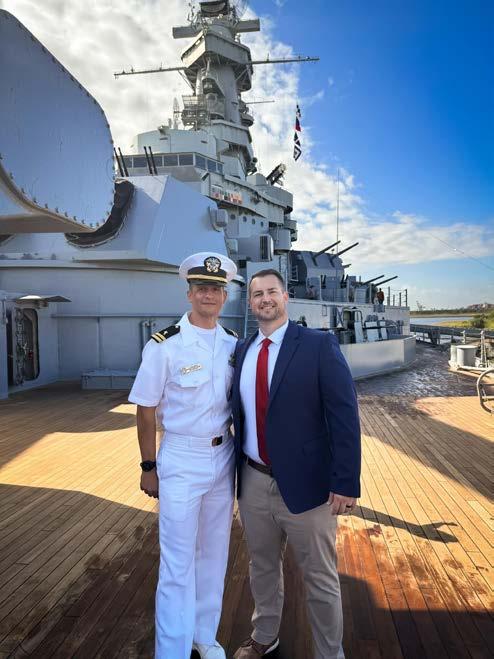
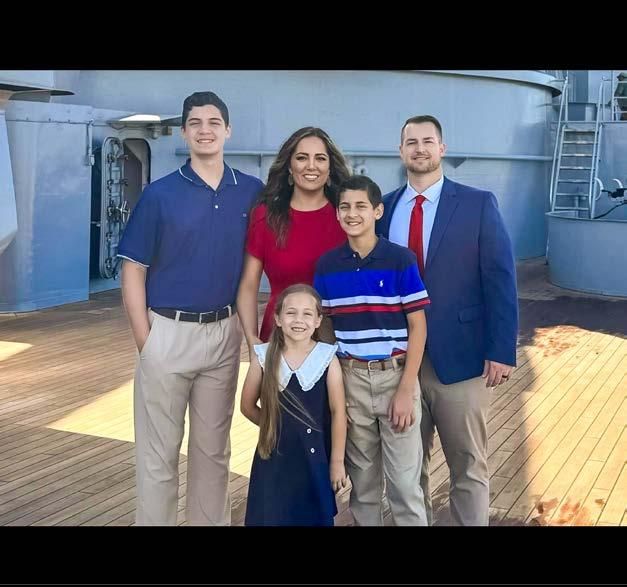
through chaplaincy? Visit fwbnam.com/chaplaincy to access a list of all current Free Will Baptist chaplains and learn more about joining their ranks today!

Early Monday morning, thousands of white Altocumulus and Cirrocumulus cloudlets filled half the dome of the sky here at the western edge of Central Appalachia. According to Gavin Pretor-Pinney and his Cloudspotter’s Guide, the Alto clouds are three miles above me, the Cirro farther, at eight miles above.
Monday, I was looking north and east. I liked the way Pretor-Pinney helped me identify cloud sizes. “Cirrocumulus appear like little grains of salt. The larger Altocumulus cloudlets generally appear the width of one to three fingers, held at arm’s length,” he says. From where I stood on my deck, eight miles below the Cirrocumulus, they looked tiny. But suppose I were flying into the middle of them in a Boeing 747, at the plane’s max altitude, which is the Cirro’s height, about 45,000 feet. How large would those grains of salt look then?
Small things appear small depending on where we sit, stand, or lie when we see or experience them. A seven-foot tall, 1,100-pound bull moose looked small and harmless in the New Hampshire backwoods when he was 100 yards away. But ten feet away,
he was enormous and formidable, so I stayed in my car or climbed a tree.
Monday, I saw the small Alto and Cirro cloudlets “clearly,” like the blind man Jesus healed at Bethsaida (Mark 8:25). I had recently neglected cloud-watching, but Monday I remembered what I had been missing. For example, cloud events in Scripture were signs of the Lord’s presence for prophets, priests, kings, and disciples. Remember Noah’s bow in the cloud, Moses’ cloud by day and fire by night, and the cloud that filled Solomon’s new Temple, and especially the cloud that took Jesus from sight at the ascension? I recalled Job as the Lord questioned him: “Who can number the clouds…or stay the bottles of Heaven” (38:37)? Not Job. Not me.


One of my favorite cloud stories is found in 1 Kings 18. At the prophet’s direction, Elijah’s servant atop Carmel saw “nothing” six times, but on the seventh, he spotted a “little cloud like a man’s hand” rising from the sea.
Shortly, that tiny cloud grew black and angry and spread up and out into an enormous Cumulonimbus thunderhead

that reached the top of the troposphere. Then wind, torrential rain, thunder, lightning, and perhaps hail assaulted the earth for the first time in more than three years. We don’t know about the hail, but I can imagine it because rain, thunder, lightning, and hail are what Cumulonimbus clouds do best.
Earlier God had sent consuming fire on Carmel. Now, torrential rain spread everywhere. That’s what the hand of the Lord can do. Elijah, wise man that he was, ran before Ahab to the entrance of Jezreel. Hold on to the hand of Jesus and stay ahead of your enemy, Elijah seems to say to me.
On our deck, gazing at the clouds, I thought of the old children’s song: “He’s got the whole world in His hands.” But our Lord doesn’t just hold the world. He holds everything: people, nature, the cosmos itself. All of it, everything, everywhere, in His hands. And in Him, “all things consist,” Paul reminded us (Colossians 1:17).
Tuesday, a tiny female downy woodpecker landed on the edge of our deck, clung upside down, and briefly pecked at a seed or insect between the boards. Then off she darted, as if spooked. The downy is the smallest North American woodpecker, about sparrow size, and mainly black on the upper parts including wings, plus a mostly black tail with white bars. We knew ours was female because she had no red patch on the back of her head as males do. These tiny woodpeckers are rare in our backyard. Her visit was wondrous but too brief. I yearn for her return.
Ornithologists call woodpeckers a “keystone species,” meaning they have a large impact on other species and their environment. They aid pest control and create habitat for other woodland creatures. They are top-notch consumers of grubs, beetles, and ants that damage plants. In addition, their large and deep holes in trees offer homes to tiny owls, other birds, and even woodland ducks and rodents.
Woodpeckers live between four and eleven years. Our large and beautiful pileated woodpecker that has regularly visited dead trees and stumps along our creek bank
is MIA. He has not shown up this year. Year after year we have watched him pound and peck for insects twenty times per second — 1,200 times per minute and up to 12,000 pecks a day. Always without either a concussion to his tiny brain or a migraine.
Our backyard “creatures great and small,” to use James Herriot’s words, bless me.
I’m reminded, too, I’m afraid of certain tiny things, especially scurrying ones. A baby five-lined skink was in our mailbox Wednesday. The family who built our house not only built a nice house we enjoy but also a substantial brick mailbox. Wednesday, when I opened the mailbox door, the tiny skink (I call it a lizard) scurried around inside and disappeared into a tiny hole I had never noticed. Thankfully, he apparently was as afraid of me as I was of him. He was a baby, no doubt, but quick. He scared me. Three inches long counting his tail, almost black with five yellowish stripes — two on each side and one down the middle of his back. The next three days, he scurried around our mailbox, thoroughly creeping me out before slithering down his hole. By Saturday, he was gone, grown too large to go in and out of his little hole, I assumed. Good riddance! Although I know he eats those small black spiders I sometimes see in the mailbox. Still, I’m glad he’s out of there.
The proverbialist counts lizards among four small things on earth that are “exceedingly wise” (30:28). They live in kings’ palaces (as well as mailboxes), and “you can take [them] in your hands.”
Not me.

Why did the proverbialist call lizards “exceedingly wise”? First, some translators prefer spider rather than lizard here. I’m sticking with lizard, although I dislike spiders, too, so spider or lizard, it doesn’t matter to me. The question is, why is this small creature considered wise, quick of wit and a model for me, as one commentator says?
Saint Gregory the Great, a writer and bishop of Rome, called the biblical lizard a symbol of the simple, earnest person who may rise to kings’ palaces better than a sinful, conniving person. Other ancient expositors connected the four wise animals of Proverbs 30:24-28 (ant, rock badger, locust, and lizard) with the Church Triumphant. Still others focus on the power and significance of small things. Nineteenth century commentor Franz Delitzsch called the lizard nimble and cunning, “a little beast that knows how to…scale walls….[and] gain an entrance into palaces.”
All that suggests these “little beasts” are models for us Christ followers. The ants suggest preparation and perseverance trump power. Like tiny badgers who seek shelter and safety among rocks, our wit and inventiveness top arrogance and ambition. Like locusts in their swarms, we
“swarm” of Christians are formidable messengers marching in rank to carry the gospel. As for us “lizards,” we are part of Christ’s kingdom and will enjoy our King’s heavenly palace one of these days.

Some weeks I get too caught up in the big things in the world — wars, addictions, abuses, killings, spiritual lethargy, rebellions, and political wranglings. This week, I’ve turned my eyes instead to the Lord’s small things — his tiny creatures and creations here on the western edge of Central Appalachia. Those small things have blessed me. They are reminders of who my Lord is and the large things He does for me. I’m grateful!
About the Writer: Brenda Evans lives and writes in Ashland, Kentucky. You may contact her at beejayevans@windstream.net.

As of January 1, 2024, our rates are all above 4% and go as high as 4.75%.
Although Free Will Baptist Foundation is still in the process of registering with various states, some states allow for a limited number of investors during the registration process. Other states allow ministries to invest with our program throughout registration.
While it is true you can invest in many places with good interest rates, only one place allows you to fund multiple Free Will Baptist ministries. Our programs helped the Foundation establish a grant program that already has produced $4.4 million in gifts to Free Will Baptist ministries, along with an estate planning program with more than $35 million in future estate gifts! We encourage ministries and individuals to contact us today to learn more.

How did you acquire your own unique personality? Many factors contribute to your personality traits. Genetics are a factor, and not just your DNA makeup. Sure, we inherit certain personality traits from our parents. However, this does not mean your personality is split 50/50 between your parents. You are not exactly half of each parent’s personality but rather a seemingly random mix. It’s certainly not random, because God did the mixing to design you for what He knew you would need.
Genetics explains some of the quirks in your personality. For instance, I am 75% Scottish, English, and Irish, but roughly 17% of my genetics come from Scandinavia (Denmark, Sweden, and Norway). This may explain my size (six foot two and more than 250 pounds) as people from these countries tend to be big and tall. Maybe my 17% of Viking blood also explains my great love for football since the Vikings were known as great warriors, and football has been described as legalized war.
Many personality tests are available, along with many different labels for personality types. The first I ran across were sanguine, choleric, melancholy, and phlegmatic. Most people who study personality types believe no one is 100% of any personality type but a unique mixture of at least two. Experts also believe personality types are not set at birth, but everyone has a natural tendency to revert to their original personality type. In addition to inherited personality, our personalities are shaped by life events and experiences. Sometimes, a natural introvert may encounter a job situation requiring him or her to be more
outgoing, and the personality shifts accordingly. Someone without natural leadership traits may be forced to lead and develop those skills. The indecisive may be forced into situations where they must make decisions.
God designed us all with different personalities, and sometimes clashes develop between personalities. Most experts in team building emphasize the benefits of a mix of personality types because the differences hold the group in tension and help offset bad decisions. Every personality type has strengths and weaknesses. Your weakness may be a strength for another personality.
As much as we would like to believe we can manage any situation, the truth is someone with a different personality may handle some things better than you. In a team or church context, we should let others use their God-given gifts to make the whole team or congregation better. We can’t all be “the life of the party” or the strong, solid, decisive leader, or the meticulous accountant type, or the easygoing type that seems to let nothing bother them. However, we need all these varying types of people as we work to build God’s Kingdom.
To paraphrase 1 Corinthians 12, we can’t all be eyes, ears, mouths, or feet, but for the church to function, we need every part of the body, just like we need all personality types.
About the Columnist: David Brown is director of Free Will Baptist Foundation. To learn more about the grants program, visit www.fwbgifts.com.

 BY JOHN BRUMMITT
BY JOHN BRUMMITT
I am the son, son-in-law, nephew, and brother-in-law of pastors’ wives. Over my lifetime, I have seen countless churches call pastors to shepherd their congregations, and, of course, bring his wife and family in tow. We often view the pastor’s family as a sort of a “package deal.” Pastors’ wives, however, often have special concerns about which the rest of us may not be aware.
Every pastor’s wife I know wants to be involved in her husband’s ministry and serve her church. I do believe God prepares helpmates to help. (Makes sense, doesn’t it?) Often, however, pastors’ wives are unable to develop close personal relationships within the church because they must be available to everyone. As a result, they may have few people in whom to confide. Too often, these hard-working ladies find themselves under a microscope and face undeserved critique. You’ve heard the comments: “Well, the previous pastor’s wife used to do… .” You can finish that sentence with whatever you like.
In addition to the criticism they face, pastors’ wives know the struggles their husbands face, along with the pressure of always being on call. It is hard for them to see their husband stressed and anxious, knowing he could be
Continued on page 56
Those who embark on the journey of higher education will find it an exciting and life-changing experience. Students encounter new freedoms, new learning opportunities, and new friends. However, college life also brings a new set of challenges, especially in finances. College students face a myriad of new financial responsibilities, from tuition and textbooks to daily living expenses, and often manage these expenses independently.
After the countless hours of studying, writing, testing, and finally graduating, these young people begin another new journey and (sometimes harsh) reality. Entering the workforce after college graduation marks a significant milestone and brings another new set of financial responsibilities. These early career years include some of the most important financial decisions they will make in their lifetimes. It is crucial for young adults to establish healthy financial habits to set them on the path to long-term success. Consider the following seven financial tips to start on the right track.
Developing a realistic budget is paramount to financial success. You will have both a new income and new categories of expenses. Understanding and account-
ing for both will help you see your overall financial picture. Write it all down or use a budget app. Then be realistic about your spending habits and allocate funds accordingly.
$ LIVE BELOW YOUR MEANS. With a new job and a new income, it is tempting to embrace a new lifestyle, an expensive one. I get it. But a six-figure income doesn’t necessitate a six-figure lifestyle. Instead, consider living below your means. Avoid unnecessary expenses like a new car payment; instead, save a portion of your income each month. Living below your means will help you achieve financial freedom and goals more quickly and prepare you for economic hard times.
$ MAKE GIVING A PRIORITY. I’m sure you have heard the old sayings “you cannot outgive God” and “it is more blessed to give than receive.” Both are true. I have experienced the blessing of giving back to God in my own life. Generosity glorifies God, but it also blesses us as we lay up treasures in heaven and not on earth. The more generous we are, the more content and happy we will be, and the less hold money will have on us.
$ BUILD AN EMERGENCY FUND. Life is unpredictable, and unexpected expenses arise. An emergency
fund puts a buffer between you and those unexpected expenses. It turns crisis into inconvenience. Your emergency fund is a reserve to cover unexpected expenses and should only be used for true emergencies. Set aside a portion of your income each month until your fund can cover (at least) three to six months’ living expenses.
$ PRIORITIZE STUDENT LOAN REPAYMENT.
Many students graduate with student loan debt. If not managed correctly, these loans can cripple your ability to achieve financial goals and freedom. Plan for repayment. Pay extra each month. Stay focused, consistent, determined, and disciplined.
$ START RETIREMENT SAVINGS. It may be tempting to procrastinate saving for retirement because it seems so far away. However, now is the best time to start saving. If your employer has a retirement plan, sign up for it on day one. Take advantage of employer matching contributions. The earlier you save, the more time your savings has for growth.
$ CONTINUE TO LEARN AND DEVELOP SKILLS. Learning does not stop after college. Invest in professional development to enhance your resumé
Continued from page 54
called to handle a difficult situation at any point in time. And that moment could take away from carefully planned (and very important) days off together.
Many pastors’ wives also have financial concerns. While being the wife of a pastor can be rewarding in other ways, pastoring, typically, is not a highly-paid profession. Making ends meet can be a big concern. And when a pastor is bi-vocational, the care of the family often falls on the spouse. Without a plan to save, approaching retirement years may add increasing stress. Sadly, I have seen many pastors’ wives who had to rely on their children throughout retirement because nothing had been set aside while their husbands were pastoring.
Often, pastors and their families need help to start saving for their future ministries. As church members, it is our calling to care and provide for the shepherds and spouses we call to our congregations, not only for their immediate needs but also for their future needs. These faithful wives
and maximize your earnings potential. Look for ways to learn new skills, increase your knowledge base, and create new growth options. Personal development can lead to increased income opportunities.
Entering the post-graduation workforce is both an exciting and daunting experience. Wise financial planning and decisions during the early years can help shape your future and build a strong financial foundation. It takes time and discipline, but it is worth it. Your future self will thank you.
About the Writer: Chris Compton is accounting administrator for the Board of Retirement. He graduated in 2007 with an M.A. in Bible exposition from Columbia International University. A 1998 graduate of East Tennessee State University, he has over 18 years of administrative and financial experience in varied fields, along with seven years in pastoral ministry.
and their husbands carry a heavy load. Providing for their future helps lighten that load. Care for your pastor and his family. Understand God has called them to carry these burdens of ministry together, and He has called you to help carry their burdens as well. Healthy pastors make for healthy churches. Looking out for them financially now, as well as for their future, is a small part that easily can be overlooked until it is too late.
While it may seem impossible to your pastor and his family to set funds aside for retirement, it is vital, and it is something to start as soon as possible. If you would like more information on how you and your church can help, contact the Board of Retirement, and let’s begin with a conversation. We can’t relieve all the concerns of pastors’ wives, but this is one area we can help you help them.
About the Writer: John Brummitt became director of the Board of Retirement in January 2016. He graduated in 2011 with an MBA from Tennessee Tech University. A 2004 graduate of Welch College, he has been with the Board of Retirement since 2006: www. BoardofRetirement.com.
Does the idea of taking an IQ test bring back memories of red ink, like when your high school teacher handed back test results? High IQs conjure up luminaries of intellect. Names like Einstein and Oppenheimer float to the surface of our thoughts. Being around someone with superior intellect can be intimidating. Yet, in the sacred pages of Proverbs, wisdom — a treasure beyond mere knowledge — is held in high esteem, encompassing discernment and the judicious application of knowledge.
Brilliance does not equal leadership capacity. In fact, while the world benefits from the theories and inventions of minds such as Isaac Newton, Leonardo da Vinci, and Marie Curie, few of these Mensa minds ever led any organizations or groups of people. The brilliance of missionary William Carey was less about missions and more about his linguistic genius in translating Scripture into numerous languages.
1 Timothy 3
1 John 3:19
Luke 22:26
James 3:1, 13-18
“Having convictions can be defined as being so thoroughly convinced that Christ and His Word are both objectively true and relationally meaningful that you act on your beliefs regardless of the consequences.”
Studies by Howard Gardner expanded the study of intelligence into multiple categories including: linguistic, musical, critical evaluation, interpersonal (emotional — often referred to as EI or EQ), among others.1 John Maxwell simplified the idea of emotional intelligence when quoting Theodore Roosevelt: “Nobody cares how much you know, until they know how much you care.” Ben Mandrell, CEO of Lifeway, recently noted at a leadership conference that, in school, the measure of effectiveness is 75% IQ (knowledge) and 25% EQ (emotional intelligence or people skills), but when we reach the real world, the numbers flip for effectiveness, 75% EQ and 25% IQ.

possess not only mental acuity but also emotional wisdom and, most importantly, an unwavering conviction in principles that align with moral and biblical truth.
Perhaps you have heard the old adage, “He may not be the sharpest knife in the drawer.” We must realize true leadership is not about being the sharpest implement but the most utilized. The world seldom seeks the precision of a sharp blade; more often, it seeks the nurturing care of a “spoon” or the practicality of a “butter knife.” Leaders are called not to display their brilliance as a spectacle but to mold and influence correct thought and action through conviction and emotional insight.
—Josh McDowell
Al Mohler places convictional intelligence (CQ) highest of all. CQ is the bedrock of one’s theological and scriptural stance, transcending mere belief to become the compass by which all decisions are charted. A leader must 1 https://www.simplypsychology.org/ multiple-intelligences.html
In the pastoral epistles, like 1 Timothy, the qualifications for ministry leadership do not emphasize the acuity of a professor but the ability to teach and lead with convictional and interpersonal prowess. In the grand design of God's Kingdom, the sharpest knife is not the instrument of choice; it is the servant leader, guided by wisdom and conviction, who truly makes the cut.
About the Columnist: Ron Hunter Jr. has a Ph.D. in leadership and is CEO of D6 Family Ministry. You may contact him at ron.hunter@d6family.com


Tuesday Evening Service
NAM Recipient:
Justin Feight Family Jamestown, ND
IM Recipient:
Bradley and Madison Mercer
University of Missouri International Students
SUNDAY AM:
BLAKE NANCE
Beulah FWB Church
Pensacola, Florida
SUNDAY PM:
DEREK ALTOM
D6 Family Ministry
Nashville, Tennessee
MONDAY PM:
FUAD FARHAT
New Life Church
New Bern, North Carolina
TUESDAY PM:
TYLER PENN
IM Missionary
Champaign-Urbana, Illinois

Tickets are $15 during pre-registration and $20 onsite.
Voting Delegates
National Association (All voting delegates must be members in good standing of a FWB church.)
❏ National Board/Commission Member
❏ Ordained Minister
❏ Ordained Deacon
❏ State Delegate (Authorization Required)
❏ Local Church Delegate (Delegate Card Required)
Non-Voting
❏ Attendee (All Ages, Including Infants and Toddlers)
Preschool
Vertical Three Conference
❏ Ages 3-5, Attending Preschool Worship - $25 ($35 onsite)
❏ Ages 0-5, Not Attending Preschool Worship - NO FEE
Students: $30
Any student or competitor* attending any CTS competition or event MUST pay $30 V3 conference fee ($40 onsite).
❏ Grades K-3
❏ Grades 4-6
❏ Grades 7-12
*Competitors must pay V3 conference fee in addition to CTS competition fees already paid.
College Age | Adults: $25
Adults attending any competition or event MUST pay $25.
❏ Adult Attendee
V3 Event: Blessing Offor Qty_______ x $15 = _______
Tuesday, July 23, 9:00 pm ($20 onsite/at the door)
V3 Information: 800-877-7030 | www.verticalthree.com
Tickets
WNAC Laughter and Latté ...................... Qty_______ x $12 = _______
Monday, July 22, 8:30 p.m. ($15 onsite; limited availability onsite)
Welch Alumni & Friends Luncheon ...... Qty_______ x $45 = _______
Wednesday, July 24, noon ($55 onsite; no tickets will be sold between pre-registration closing and convention; limited availability onsite)
National Association Info: 877-767-7659 | www.nafwb.org
Register April 1 – June 21 | No Refunds
Payment
Card
Return to:


Embassy Suites by Hilton Tampa Downtown Convention Center
513 S Florida Ave
Tampa, FL 33602
800-362-2779
Room Rate: $200 Single/Double, $220 Triple/Quad
Parking: $37/Night (Valet Only)

Hotel Tampa Riverwalk
200 N Ashley Drive
Tampa, FL 33602
800-774-1500
Room Rate: $149
Parking: $32/Night (Valet Only)
Tampa Marriott Water Street
505 Water Street
Tampa, FL 33602
800-228-9290
Room Rate: $170
Parking: $33.75/Night (Valet Only)

The Westin Tampa Waterside
725 S Harbour Island Blvd
Tampa, FL 33602
888-717-8853
Room Rate: $165
Parking: $35/Night (Valet Only)

1. Prepare personal information. You will need the following:
+ Name(s), address, city, state, zip
+ Phone/email
+ Credit card information
+ Special requests: accessibility, rollaway, or crib
2. Make reservations.
+ Online reservations open Monday, May 13, 9:00 a.m. CDT. Links to make reservations will be available at www.nafwb.org.
+ The group code (for convention rate) will be built into the reservation links.
+ Contact the hotel directly for changes to reservations or issues with a reservation. Note: NAFWB is not responsible for housing issues.
3. Things to remember:
+ Hotels have been told not to accept reservations before opening day.
+ Hotel rates do not include 13.5% tax and $1.70 Tourism Fee per room, per night.
NOTE: The first night's room and tax will be charged for canceled reservations. While the charge is non-refundable, the reservations are transferable. Available rooms may be posted at nafwb.org for transfer. Note: Convention policy supercedes the hotel policy.
Groups making eight or more reservations can contact Ryan Lewis before April 12 (extended) for more information.
ryan@nafwb.org or 877-767-7659
Reservation cut-off date: Friday, June 21, 2024
Visit nafwb.org/convention for more information.


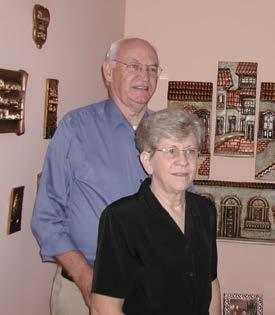

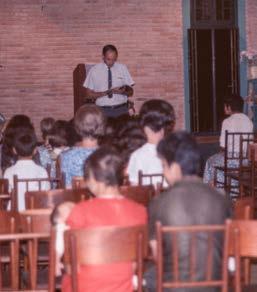
NOVEMBER 28, 1935 — JANUARY 25, 2024
BY JEANCARLO ACHÊThank you for the opportunity to share about the person who served as God’s instrument in giving my life a completely new direction — missionary Bobby Poole.
In December 1980, a school friend invited me to visit his church, an evangelical church. Although I am from a Catholic family influenced by spiritualism (common in Brazil), I accepted the invitation. The next morning, I found myself in a Sunday School class learning about the Bible with missionary Geneva Poole. I was impressed and impacted by her teaching and returned on subsequent Sundays.
A few weeks later, I learned about the worship service on Sunday evenings and began attending. I had the privilege of listening to a big American man preach with passion about the Scriptures and about Christ. He ended every message with an invitation for salvation.
Soon, a flurry of activity began around a camp session to take place in January 1981. Great excitement filled the air, and I felt quite anxious to participate. When I look back, I see the hand of God directing all these details. At camp, I made a resolute decision for Christ after the message by Lelis Fachini, a missionary from Asas de Socorro (Missionary Aviation Fellowship).
Many important things happened in my life in 1981 that determined much of who I am today, 42 years later. I answered the call to preach. I began a relationship with the one who later became my wife. And it was a year of much spiritual growth. At all times, I had the privilege of receiving guidance and pastoral care from Pastor Bobby Poole and his wife Geneva. His passion for Christ and mercy for people were remarkable.
At the seminary, students commented Bobby was from the “school of Gamaliel,” always more focused on the spirit of the Law rather than the letter of the Law. His careful testimony gave us a safe example of how we should live the Christian life. My wife Flávia attended




the Pooles’ church from childhood. She was adopted as a “daughter” by Pastor Bobby. Consequently, after we married, he adopted me as his “son,” too.

With great satisfaction, I shared the fruits of my ministry with him, always making a point to tell him he played a large part in everything we achieved over 36 years of ministry. Perhaps the peak of his “holy pride” came when my family and I worked as cross-cultural missionaries in the Republic of Ireland for twenty months. It was a successful journey. A few years after we returned to the church in Jaboticabal, Pastor Bobby and Mrs. Geneva accompanied me on a return visit to Ireland. What a special memory.
It is difficult to express in a short article the powerful influence of the life of this humble and dedicated servant of God. Without doubt, he impacted the lives of hundreds, even thousands, of people. I’m sure when people think of Pastor Bobby, they immediately think of their spiritual lives. This, perhaps, should be our great ideal in life, for people around us to see Jesus through us in a remarkable way.
Pastor, friend, spiritual father, teacher, theologian, evangelist — how is it possible to fit all these skills into a man of such simple origins? But God did.
Thank you, Pastor Bobby. Thank you, Free Will Baptist International Missions (IM). Thank you, God, for the life and ministry of a man who did not live for himself but lived “by faith in the Son of God, who loved me and gave himself for me.”
See you later, Pastor Bobby!
About the Writer: Jeancarlo Achê pastors Jaboticabal FWB Church. He has served as president of the International Fellowship of Free Will Baptists since 2015.
In the February-March issue of ONE Magazine, Welch College President Matt Pinson reviewed The Great Dechurching. The second part of that review is on page 36 of this issue. I encourage you to read it. Forty million people (15.5% of the U.S. population) have stopped attending church over the past 25 years. Authors Davis and Graham define dechurched as people who once attended church at least once a month but now attend less than once a year. They note we are in the middle of the largest and fastest religious shift in the history of the U.S. Before now, the largest religious shift occurred between 1870 and 1895, and in the opposite direction, where church attendance more than doubled. How should we respond?
In Part 2, President Pinson identified 22 strategies for any church. Let me share some thoughts on only one: “Find out who moves into your community and strategize how to invite them to your church.” In a recent Better Together Podcast with Davis and Graham, they revealed — to their surprise — the top reason people became dechurched was they moved. Not anger. Not theology. A simple change of location.
So, I encourage you to reach out to people who move into your community. Sometimes, a nudge is all that is needed to bring someone into your church family. We have recently partnered with a group called Bless Every Home (nafwb.org/bless). Through this free app, you can receive a list of neighbors for whom to pray daily. The app also provides a weekly list of newcomers to your community for a $25 per month fee.
Evaluate your digital presence and develop a gameplan. Make sure your website includes “I’m New Here,” so those considering your church can find important information quickly. Include location, service times, and what to expect. Also explain where to park (hopefully in visitor parking) and briefly describe services, typical attire, and childcare. A brief welcome video is also helpful. For more guidance, see cloversites.com/blog/7-pages-yourchurch-website-should-have
Develop a coordinated social media and digital gameplan since that is where new movers often turn for church information. We provide individual guidance during Know Your Community feedback sessions: nafwb.org/know Davis and Graham also suggest updating your profile on search engines. Make sure your NAFWB Church Directory (nafwb.org/directory) profile is appealing. For example, do you have a church picture, short description, and quick welcome video (90 seconds or less)? Send updates to anna@nafwb.org
Be inviting. Demonstrate your church wants new people. Put up directional signs on weekends, even if everyone knows where your church is. These signs send the message “new people are welcome!” Create events (Christmas Eve service, Good Friday service, Easter services, VBS, honoring first responders) and invite new people. Train and equip your congregation to invite them. Provide information cards for neighbors, co-workers, classmates, and extended family members. During these events, be sure to invite everyone to your services.
Train the congregation to think of creative ways to connect with others to invite. If you haven’t done so already, try The Hope Initiative (nafwb.org/hope). Make it your culture to bring newcomers in (or back) to the church. Thirty-eight percent of dechurched evangelicals say they would return to church if new friends were there.
Our country is experiencing difficult days. However, as Davis and Graham point out, the dechurched will be easier to reach than the unchurched. Let’s work together to reach or bring the dechurched back into the fold.
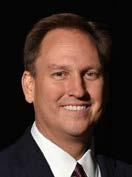 Eddie Moody Executive Secretary, National Association of Free Will Baptists
Eddie Moody Executive Secretary, National Association of Free Will Baptists

No one wants to think about tragedy, but even young families should be prepared in case of the unexpected. Since 2013, FWB Foundation & Cornerstone Estate Planning have helped thousands of families avoid the nightmares of probate court (including guardianship of children). Hopefully, your family never needs it, but be prepared in case you do!
Today, many young men are being brought up in single-parent homes, or in homes where the fathers are busy working to support the family.
With this in mind, the Generation S Conference will introduce young men (grade 6 through college) to basic life skills: auto maintenance, carpentry and home repair, gun safety, and general health & hygiene.
The conference is free to all, but you must preregister:

